updated 5:30 PM EST, Mon November 19, 2012
STORY HIGHLIGHTS
- NEW: A West Bank protester dies after clash with Israeli troops, hospital official says
- The solution is "stop shooting and that's it," Israel's president says to Hamas
- U.N. Secretary-General Ban Ki-moon arrives in Egypt to press cease-fire talks
- Palestinians don't want ground war, "but we are not afraid of it," Hamas leader says
CNN has multiple crews in Gaza, Israel and neighboring countries to bring you the latest accurate information on the conflict, the impact on people and talks to stop the violence. Turn to CNN TV and http://CNN.com for what you need to know now and watch AC360º tonight at 8 ET.
Gaza City (CNN) -- Warplanes, drones and rockets crisscrossed the sky over Gaza for a sixth day Monday as Israel pressed its air offensive against Hamas, whose leader vowed continued resistance against what he called a "criminal enemy.""We do not want escalation, nor do we call for a ground war," Khaled Meshaal of Hamas said. "But we are not afraid of it, nor will we back down."
In Israel, air raid sirens wailed all day long and troops shepherded residents into bomb shelters as rockets fired from Gaza arced overhead. In densely populated Gaza City, where rockets are launched and suspected militants live among civilians, smoke and fire poured from buildings that had been struck by Israeli warplanes or drones.
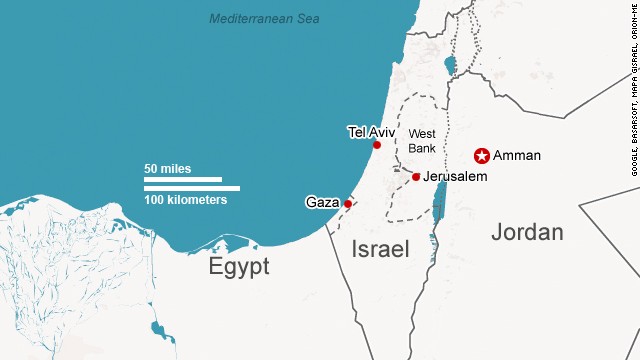 Map: Israel
Map: Israel Map: Israel
Map: Israel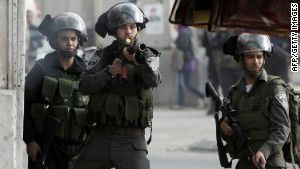 Reporter ducks as Gaza alarms sound
Reporter ducks as Gaza alarms sound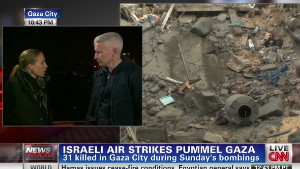 In Gaza, nowhere to go
In Gaza, nowhere to go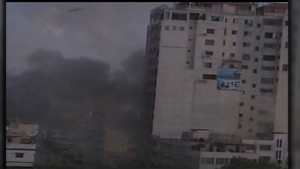 Israeli forces target media building
Israeli forces target media building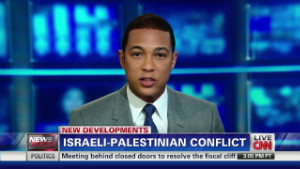 Focus on child caught in crossfire
Focus on child caught in crossfireAs the casualties and damage mount, so too have efforts to find a diplomatic solution, even as the war of words persists in earnest.
Diplomats hopscotched around the region, including U.N. Secretary-General Ban Ki-moon. He arrived in Cairo on Monday night, hours after Egypt's intelligence chief gave an Israeli delegation a letter from Hamas outlining its conditions for a cease-fire.
Israel has signaled it is open to such a scenario, but only if Gaza militants halt their rocket attacks.
"They can stop any suffering in one second," Israeli President Shimon Peres said. "Stop shooting and that's it."
Israeli government spokesman Mark Regev said a short-term "Band-Aid" solution won't do.
"We want to come out of this operation with a new situation in the southern part of Israel where our civilian population no longer has to fear an incoming rocket fired by Hamas in Gaza," he said. "If that can be achieved through diplomacy, that's good."
But Palestinian parliament member Mustafa Barghouti said Israel is to blame.
"There is room, in my opinion, for an agreement," Barghouti said. "... The problem is that Israel is using the bombardment of civilians and the killing of children as a tool of negotiations."
Palestinian health officials said 104 people, among them women and children, have died -- at least 24 on Monday. They also say 860 have been wounded in Gaza since Israel began its offensive in response to what Israel characterized as incessant rocket attacks by militants.
About half the nearly 1,000 rockets fired from Gaza since Wednesday have hit inside Israel, while about 300 have been intercepted by Israel's "Iron Dome" system and the rest landed inside Palestinian territory, the Israel Defense Forces said Monday. Three have been killed and 68 wounded, Israeli officials said.
The missile defense system intercepted several more rockets fired Monday at Ashkelon, the IDF said. But several rockets hit Eshkol, also in southern Israel, with one striking a closed school.
Israel carried out 80 strikes Monday, its military said. Since Wednesday, forces have targeted more than 1,300 the number of sites, such as government buildings, police stations, rocket-launching sites, suspected storage facilities and homes of Hamas officials.
A Gaza City stadium, where the IDF said Hamas militants launched rockets toward Israel three days ago, was among the sites hit on Monday.
Israeli forces also hit a Gaza City office building used by some media outlets -- as they had Sunday -- killing two, including the head of the Palestinian Islamic Jihad's military media office.
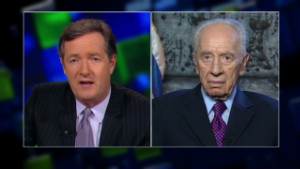 Shimon Peres on alternative to airstrike
Shimon Peres on alternative to airstrike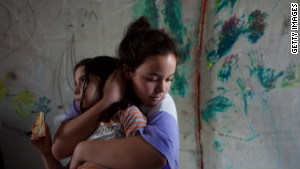 Israeli government outlines goal
Israeli government outlines goal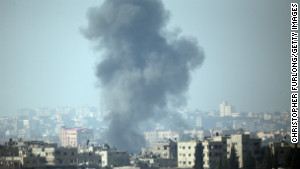 Analysis of Israeli-Palestinian conflict
Analysis of Israeli-Palestinian conflict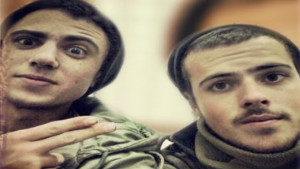 Social media takes on Gaza conflict
Social media takes on Gaza conflictThat strike targeted four senior Islamic Jihad members who Israel's military said were hiding in the building, including the information chief, Israel's military said. The others were described as key figures in military training, attack planning, long-range rocket operations and arms manufacturing within the same organization.
"We targeted only the second floor, which is where the senior terrorists were," the IDF said on Twitter, adding that reporters had been used as human shields. "The rest of the building was unharmed. Direct hit confirmed."
Despite the violence, a general in Egyptian intelligence involved in cease-fire talks expressed optimism to CNN on Monday that a deal to stop hostilities could be reached.
A senior Hamas official told CNN that sticking points include Israeli demands for a buffer zone and an end to arms smuggling.
Israel did not immediately confirm it received the letter, and no details of Hamas' proposal were immediately available.
Earlier, senior Palestinian negotiator Nabil Shaath said Hamas is demanding that Israel stop the airstrikes and end its long blockade of Gaza.
Hamas wants Israel to stop targeting the leadership of Palestinian factions and to expand the waters Palestinian fishermen are allowed to trawl from three miles offshore to 30 miles. Shaath said the fishermen are regularly shot at by Israeli forces
Gaza has been under a crippling economic embargo since Hamas won control of the territory from the Fatah-led Palestinian Authority, which controls the West Bank, after a landslide 2007 election followed by intra-Palestinian clashes. The United States, Israel and the European Union characterize the militant fundamentalist Islamic organization Hamas as a terrorist group.
In addition to Ban and the special Israeli delegation that traveled to Egypt on Monday, a steady stream of Arab League, U.N. and European diplomats are converging on the region to promote a cease-fire.
The fighting has challenged Israel's relationship with Egypt, which is trying to broker peace having recently undergone upheaval of its own. The Muslim Brotherhood-led government that took power in June has pledged to maintain Egypt's peace treaty with Israel -- the cornerstone of what peace has been achieved in the turbulent region -- but sympathy for the Palestinians runs deep among Egyptians.
On Monday, Peres praised Egyptian President Mohamed Morsy's efforts to find a solution, saying he is playing a "constructive role."
Arab League Secretary-General Nabil el-Araby and 16 foreign ministers from the league's member states were to arrive in Gaza on Tuesday, a spokesman for the organization said. Turkish Foreign Minister Ahmet Davutoglu is expected to join them, a ministry spokesman said Monday.
Palestinian Authority President Mahmoud Abbas, meanwhile, will hold talks in the West Bank with the U.N. secretary-general during his visit to the region, said Saeb Erakat, a member of the PLO's executive committee and an Abbas ally.
While the West Bank has been relatively quiet, Israeli forces clashed with Palestinian protesters two days ago in the village of Nabi Saleh. On Monday, one man involved in that clash died from injuries he suffered after being hit by a live bullet, Ramallah Medical hospital director Ahmad Bitawi said.
Ban joins a growing chorus of Western and Arab diplomats calling for end to the crisis that has raised fears of a repeat of Israel's 2008 invasion of Gaza after a similar spate of rocket attacks. At least 1,400 people were killed in that conflict.
"This must stop," Ban said late Sunday.
Calls for a truce came on the heels of the single deadliest attack -- an Israeli airstrike in Gaza City on Sunday that left a family of 10 dead within the building's broken concrete and mangled metal.
Al Qassam Brigades, Hamas' military arm, called it a "massacre committed by Israeli occupation" on Twitter.
The Israeli airstrike targeted Yehya Bayaa, "a senior Hamas member," said Lt. Col. Avital Leibovich, the Israel Defense Forces' chief spokeswoman. The IDF alleges Bayaa is one of the leaders of a Hamas rocket-launching unit.
"When I say a senior Hamas member, I mean members that have Israeli blood on their hands -- members of Hamas that planned either the abduction of soldiers or are very much involved in targeting Israelis," Leibovich said.
The house was Bayaa's home and suspected command center, according to Leibovich. She said the Israeli military was examining video of the strike to look for signs of secondary explosions, an indication that there were explosives inside. Initially, the IDF reported it killed Bayaa in the attack. But late Sunday, Leibovich said she did not know for sure whether Bayaa had been killed.
On Monday, hundreds gathered at the al-Isra mosque for the funeral of some of the family members killed, CNN's Ben Wedeman reported.
The firing of rockets before and after the funeral didn't deter the mourners.
"Revenge, revenge," some of them chanted.
CNN's Sara Sidner and Arwa Damon reported from Gaza City; CNN's Chelsea J. Carter reported from Atlanta; CNN's Ben Wedeman, Fred Pleitgen, Amir Ahmed, Jessica Yellin and Mohamed Fadel Fahmy contributed to this report.
21 
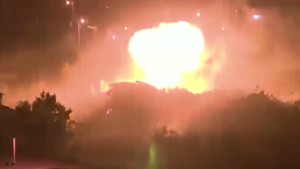 Massive explosion in Gaza City
Massive explosion in Gaza City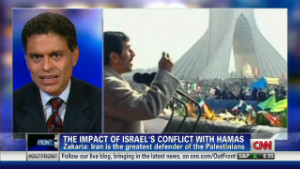 Is Iran the real target?
Is Iran the real target?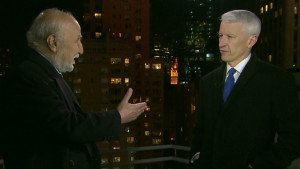 Egypt's role in Gaza-Israel conflict
Egypt's role in Gaza-Israel conflict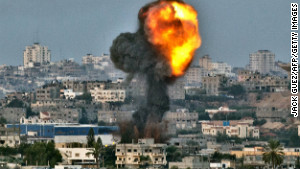 Barrage of bombs, rockets
Barrage of bombs, rockets
STORY HIGHLIGHTS
- Nathan Brown: In Gaza violence, neither side has much to gain. So why can't they stop?
- He says both sides want to show strength, deny the other a win to help their domestic politics
- He says Hamas wants to send message it can't be ignored; still fighting will likely abate
- Brown: U.S. "peace process" has wished away Hamas but must deal with reality of what is
Editor's note: Nathan J. Brown is professor of political science and international affairs at George Washington University and nonresident senior associate at the Carnegie Endowment for International Peace. He is author of six books on Middle East politics, the most recent of which is "When Victory is Not an Option: Islamist Movements in Arab Politics" (Cornell University Press, 2012).
The outbreak of violence between Israel and the Hamas-controlled "statelet" of Gaza serves no end. Both sides know that, yet they plunge ahead anyway, claiming that they are forced by their adversary to escalate the conflict.
Most experts agree that eventually the fighting will stop and leave the situation unchanged. The only question is the number of victims. If neither side has much to gain, why can't they stop themselves?
Each side suspects the other of playing domestic politics. Palestinians fear that the Israeli government is making war with an eye to upcoming elections. Israelis suspect that Hamas -- whose full name is the "Islamic Resistance Movement" -- is lobbing rockets because it is tired of its rivals' taunting that it is not living up to its middle name.

Nathan J. Brown
There is some truth to these charges, but the deeper motivations have to do less with pleasing the home crowd and more with frightening and deterring the other side.
Both sides would love to have their adversary disappear but know they cannot make that happen any time soon, so for now they each have more limited goals.
The Israelis know that they cannot dislodge Hamas from Gaza without unacceptable cost and endless occupation. But they want to punish the movement so severely that it will be deterred from future violence. Hamas knows that the damage it inflicts serves no strategic value, but it hopes that its rockets will cause dislocation and even panic in Israel and send an international message that Gaza cannot be ignored.
So the fighting likely will be contained in the end. In addition to civilian casualties on both sides (with the toll much heavier in Gaza, since Israel is the much stronger party), there will be substantial political damage, as well. The United States will be regarded in the Arab world as complicit in the Israeli offensive. And Egypt, which has a peace treaty with Israel but whose population sympathizes with Hamas, will feel badly embarrassed by its apparent powerlessness.
 Massive explosion in Gaza City
Massive explosion in Gaza City Is Iran the real target?
Is Iran the real target? Egypt's role in Gaza-Israel conflict
Egypt's role in Gaza-Israel conflict Barrage of bombs, rockets
Barrage of bombs, rocketsBut the real blame on international actors -- including the United States and Egypt -- falls not on their actions during this crisis, but on their long inaction before.
The United States under both President George W. Bush and President Barack Obama supported a harsh blockade on Gaza and pretended that the Israeli-Palestinian issue could be dealt with as if Hamas does not exist and Gaza does not matter. Under ousted leader Hosni Mubarak, Egypt quietly supported that position. Under Muhammad Morsy, Egypt's new president from the Muslim Brotherhood, Egypt is no longer quiet or supportive, but it has only been able to wield rhetorical tools.
Egypt (which now tilts toward Hamas) and the United States (which supports Israel) can, if they cooperate, probably bring about a ceasefire. What they do afterward is the real question.
There is no clear path forward for international diplomacy, but it is quite obvious what does not work: Waiting for Hamas to go away. In a visit to Gaza last May, I saw how thoroughly Hamas has come to dominate politics and society in the tiny but crowded enclave. The movement runs ministries, polices the streets and manages the economy. Gaza residents see no alternative to Hamas, nor are they asked for one, with elections canceled and opposition closely monitored.
As the Obama administration moves into its second term, it makes more sense to deal with the Israeli-Palestinian conflict that really exists rather than to pretend that there still is a "peace process" that only needs one more round of quiet talks to succeed.
Follow us on Twitter @CNNOpinion
Join us on Facebook/CNNOpinion
We recommend
From around the web
You have read this article with the title GAZA - ISRAEL CONFLICT: More strikes hit Gaza and Israel as diplomatic efforts intensify. You can bookmark this page URL http://gaytunisia-to-da-ri.blogspot.com/2012/11/gaza-israel-conflict-more-strikes-hit.html. Thanks!


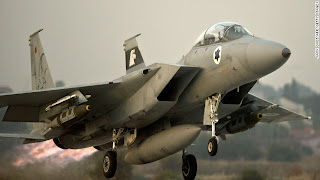



















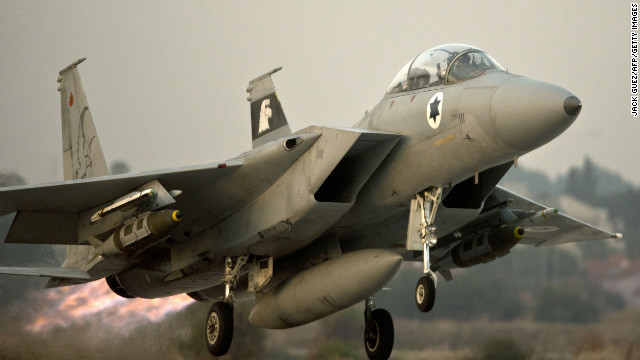 An Israeli F-15 takes off from an Israeli air force base on Monday, November 19, on a mission over the Gaza Strip. Israel carried out 80 strikes on Monday, raising to more than 1,300 the number of sites targeted since it began its bombing campaign on Wednesday, according to the Israel Defense Forces.
An Israeli F-15 takes off from an Israeli air force base on Monday, November 19, on a mission over the Gaza Strip. Israel carried out 80 strikes on Monday, raising to more than 1,300 the number of sites targeted since it began its bombing campaign on Wednesday, according to the Israel Defense Forces. 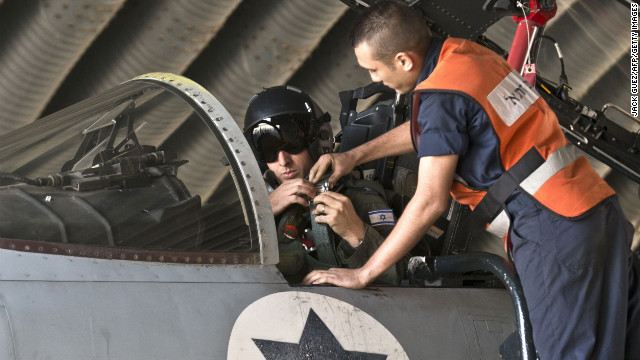 An Israeli pilot adjusts a strap as he sits in the cockpit of a jet at an air force base on Monday.
An Israeli pilot adjusts a strap as he sits in the cockpit of a jet at an air force base on Monday. 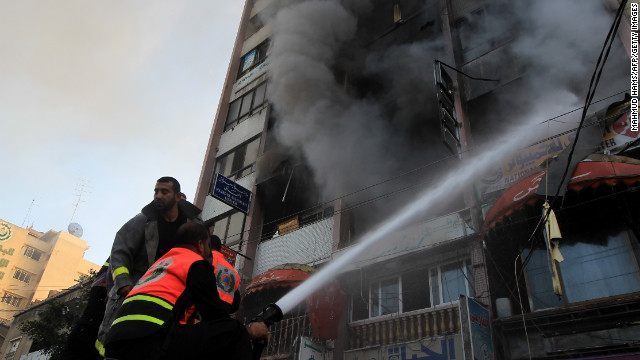 Palestinian firefighters extinguish a blaze following an Israeli airstrike in a Gaza City tower housing Palestinian and international media on Monday.
Palestinian firefighters extinguish a blaze following an Israeli airstrike in a Gaza City tower housing Palestinian and international media on Monday. 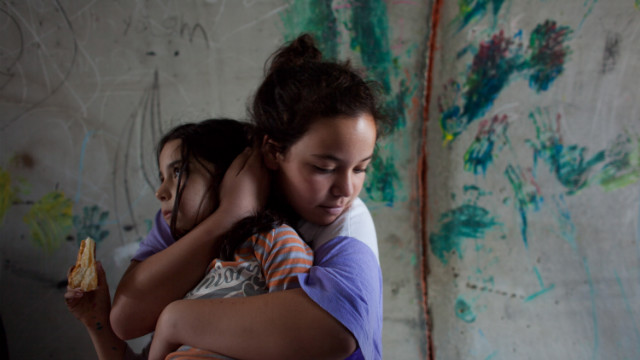 An Israeli girl holds her sister as they take cover in a large concrete pipe used as a bomb shelter during a rocket attack from the Gaza Strip on Monday in Nitzan, Israel.
An Israeli girl holds her sister as they take cover in a large concrete pipe used as a bomb shelter during a rocket attack from the Gaza Strip on Monday in Nitzan, Israel. 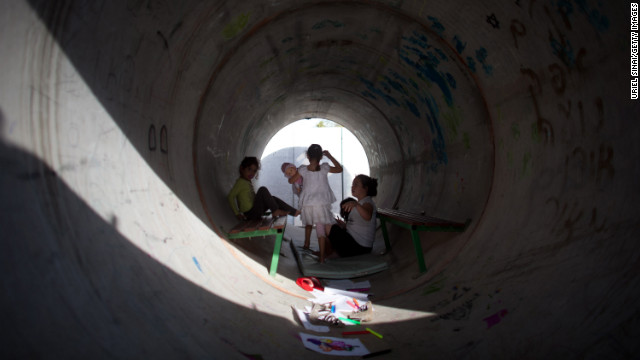 Israeli children play in a large concrete pipe used as a bomb shelter on Monday in Nitzan.
Israeli children play in a large concrete pipe used as a bomb shelter on Monday in Nitzan. 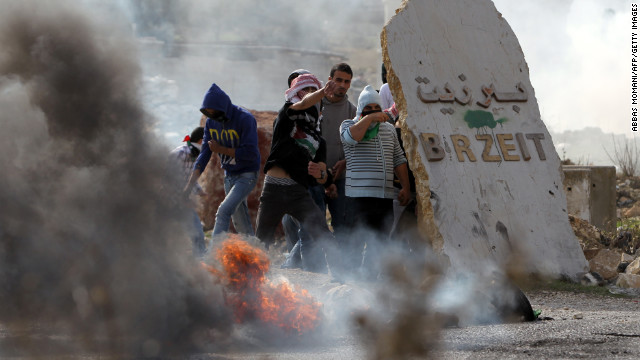 Birzeit University students clash with Israeli soldiers at the Atara checkpoint close to the West Bank university as they protest against Israel's military action on Monday.
Birzeit University students clash with Israeli soldiers at the Atara checkpoint close to the West Bank university as they protest against Israel's military action on Monday. 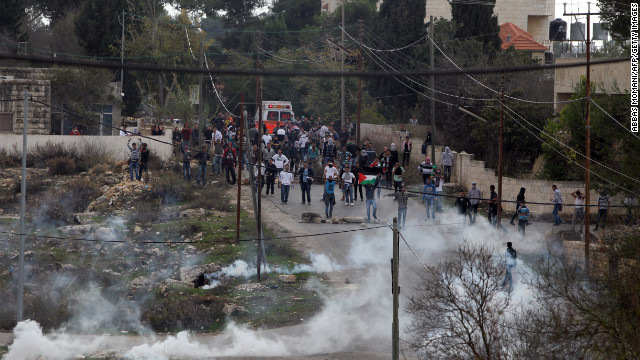 Birzeit University students clash with Israeli soldiers on Monday.
Birzeit University students clash with Israeli soldiers on Monday. 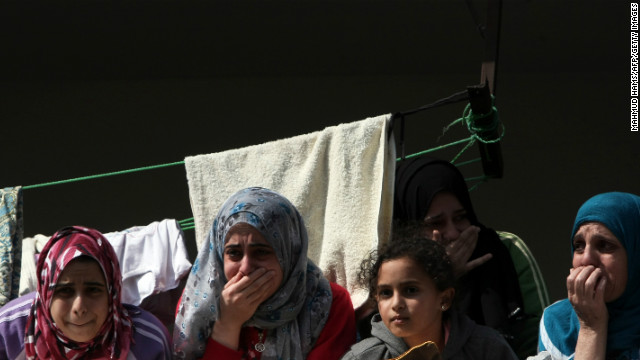 Palestinian women mourn during the funeral Monday of members of one family killed when an Israeli missile struck a three-story building in Gaza City on Sunday.
Palestinian women mourn during the funeral Monday of members of one family killed when an Israeli missile struck a three-story building in Gaza City on Sunday. 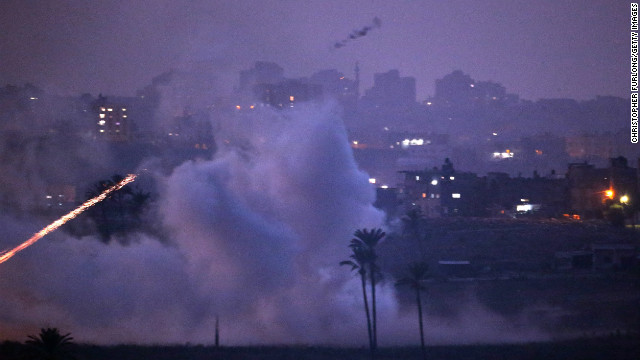 Israeli artillery shells hit a target in the Gaza Strip on Monday near Israel's border with the Gaza Strip.
Israeli artillery shells hit a target in the Gaza Strip on Monday near Israel's border with the Gaza Strip. 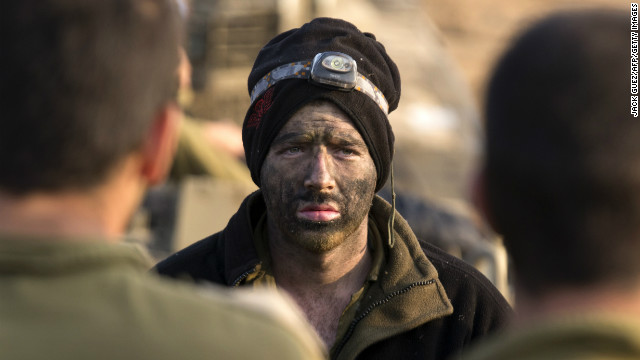 An Israeli soldier from a tank squadron attends a morning briefing at an Israeli army deployment area near the Israel-Gaza Strip border on Monday.
An Israeli soldier from a tank squadron attends a morning briefing at an Israeli army deployment area near the Israel-Gaza Strip border on Monday. 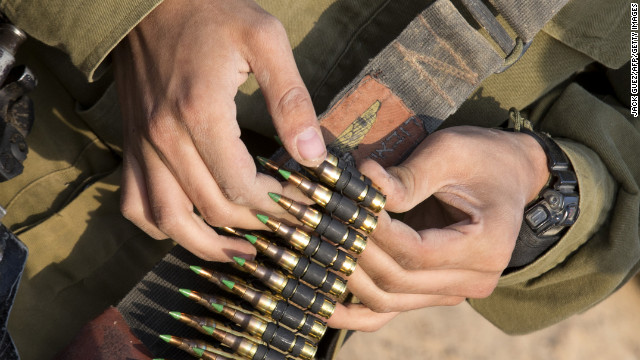 Israeli soldiers from a tank squadron prepare ammunition at an Israeli army deployment area on Monday.
Israeli soldiers from a tank squadron prepare ammunition at an Israeli army deployment area on Monday. 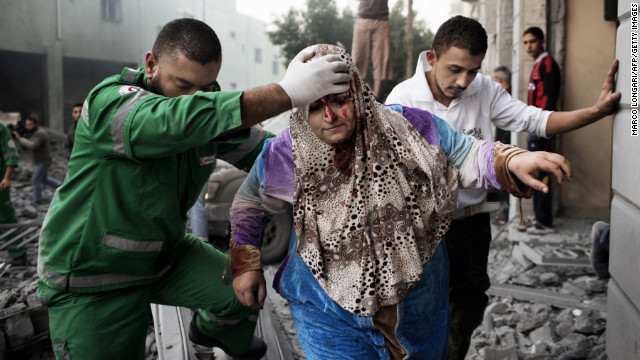 A paramedic helps a Palestinian woman out of her building, which was damaged during an Israeli air raid on a nearby sporting center in Gaza City on Monday. At least 90 Palestinians, including a family of 10, have been killed, officials say.
A paramedic helps a Palestinian woman out of her building, which was damaged during an Israeli air raid on a nearby sporting center in Gaza City on Monday. At least 90 Palestinians, including a family of 10, have been killed, officials say. 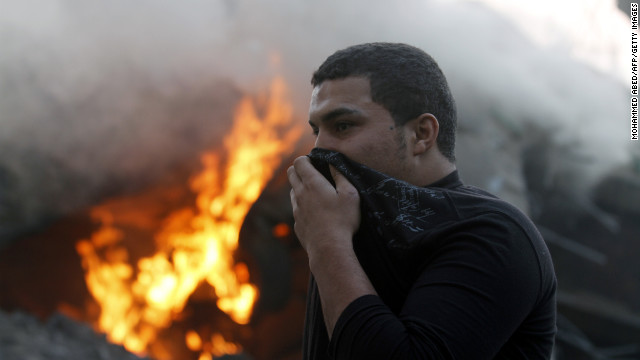 A man covers his nose and mouth as he passes burning debris after Israeli airstrikes in Gaza City on Monday.
A man covers his nose and mouth as he passes burning debris after Israeli airstrikes in Gaza City on Monday. 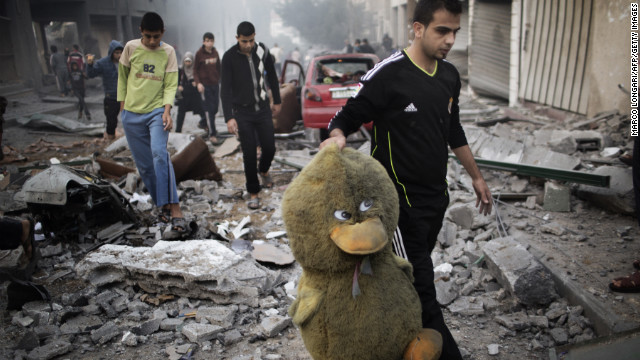 A Palestinian man carries a stuffed toy through a street littered with debris after an air raid on a sporting center in Gaza City on Monday.
A Palestinian man carries a stuffed toy through a street littered with debris after an air raid on a sporting center in Gaza City on Monday. 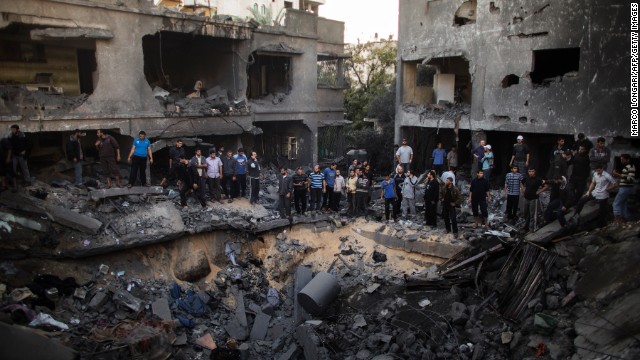 Palestinian men gather around a crater caused by an Israeli airstrike at a home in Gaza City on Sunday, November 18.
Palestinian men gather around a crater caused by an Israeli airstrike at a home in Gaza City on Sunday, November 18. 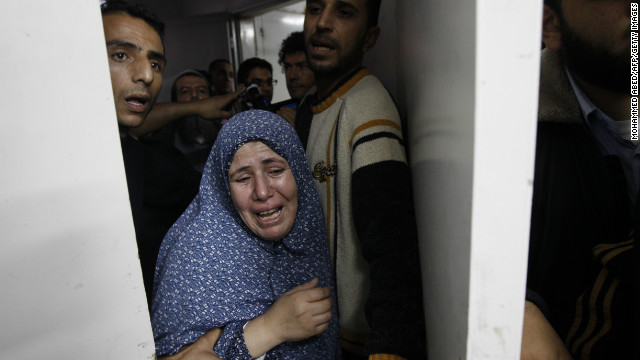 Palestinian relatives grieve at the hospital in Gaza City on Sunday over family members killed in an airstrike.
Palestinian relatives grieve at the hospital in Gaza City on Sunday over family members killed in an airstrike. 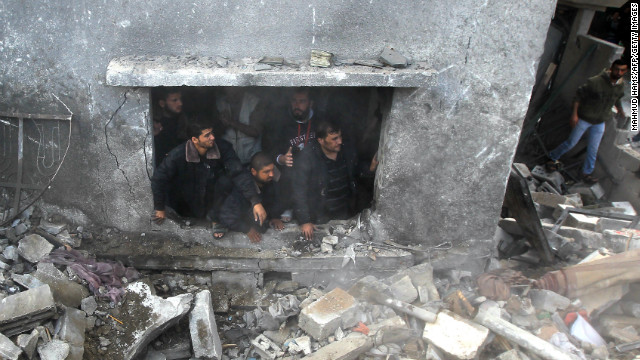 Palestinians search the debris of the home following an Israeli airstrike in Gaza City on Sunday.
Palestinians search the debris of the home following an Israeli airstrike in Gaza City on Sunday. 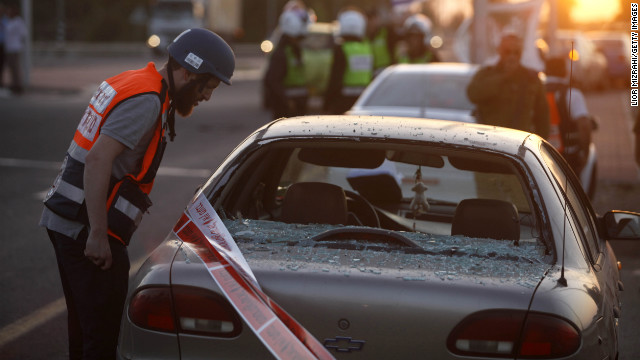 An Israeli emergency worker inspects the damage to a car in Ofakim, Israel, that was hit by a rocket fired by Palestinian militants from the Gaza Strip on Sunday.
An Israeli emergency worker inspects the damage to a car in Ofakim, Israel, that was hit by a rocket fired by Palestinian militants from the Gaza Strip on Sunday. 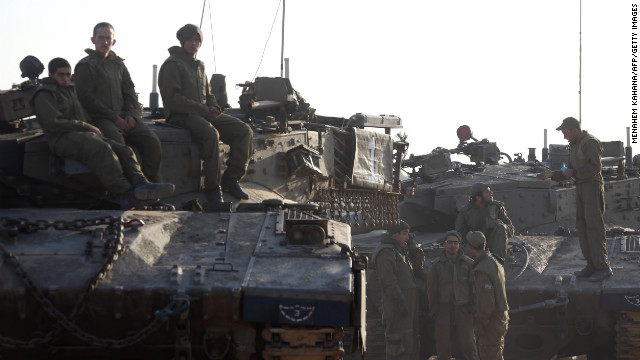 Israeli soldiers wait at an Israeli army deployment area near the Israel-Gaza Strip border on Sunday as they prepare for a potential ground operation in the Palestinian coastal enclave. Israeli Prime Minister Benjamin Netanyahu said that Israel is ready to "significantly escalate" its operation against militants in the Hamas-run Gaza Strip.
Israeli soldiers wait at an Israeli army deployment area near the Israel-Gaza Strip border on Sunday as they prepare for a potential ground operation in the Palestinian coastal enclave. Israeli Prime Minister Benjamin Netanyahu said that Israel is ready to "significantly escalate" its operation against militants in the Hamas-run Gaza Strip. 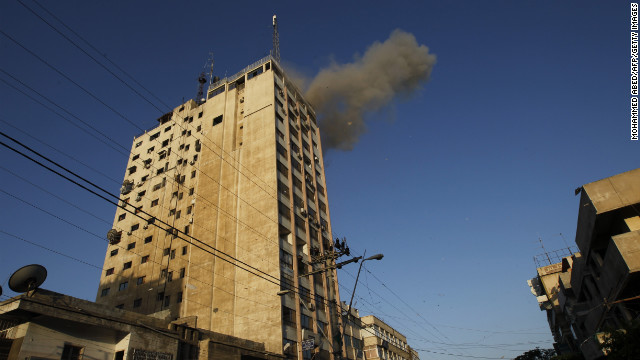 Smoke rises after an Israeli air strike on an office of Hamas television channel Al-Aqsa in the southern Gaza town of Rafah on Sunday. Israeli warplanes hit the Gaza City media center and homes in northern Gaza in the early morning.
Smoke rises after an Israeli air strike on an office of Hamas television channel Al-Aqsa in the southern Gaza town of Rafah on Sunday. Israeli warplanes hit the Gaza City media center and homes in northern Gaza in the early morning. 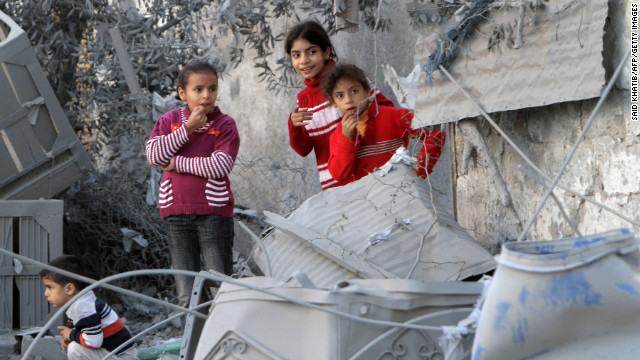 Palestinian children look at damaged buildings following Israeli air strikes Sunday in Rafah.
Palestinian children look at damaged buildings following Israeli air strikes Sunday in Rafah. 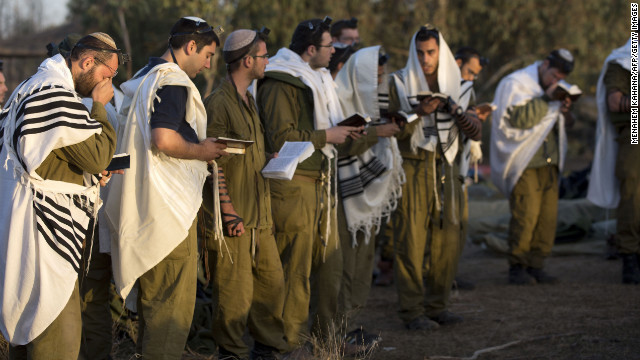 Israeli soldiers wearing prayer shawls conduct morning prayers Sunday at an Israeli army deployment area.
Israeli soldiers wearing prayer shawls conduct morning prayers Sunday at an Israeli army deployment area. 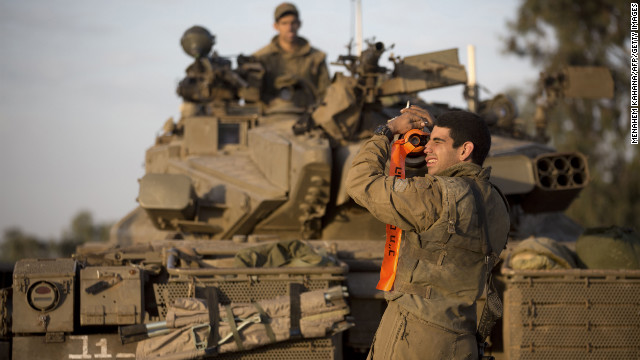 An Israeli soldier from a tank squadron adjusts the tank barrel at an Israeli army deployment area on Sunday.
An Israeli soldier from a tank squadron adjusts the tank barrel at an Israeli army deployment area on Sunday. 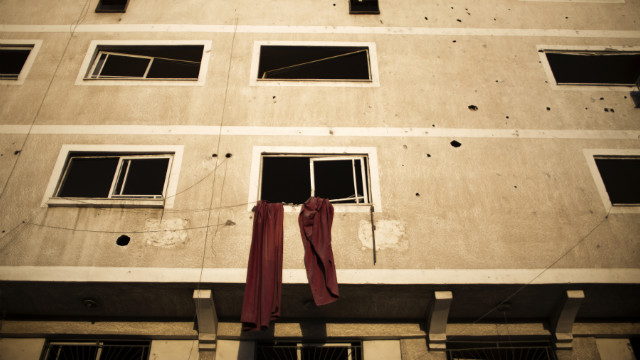 Cloth hangs from a window of a building damaged during Israeli air strikes on Gaza City on Sunday.
Cloth hangs from a window of a building damaged during Israeli air strikes on Gaza City on Sunday. 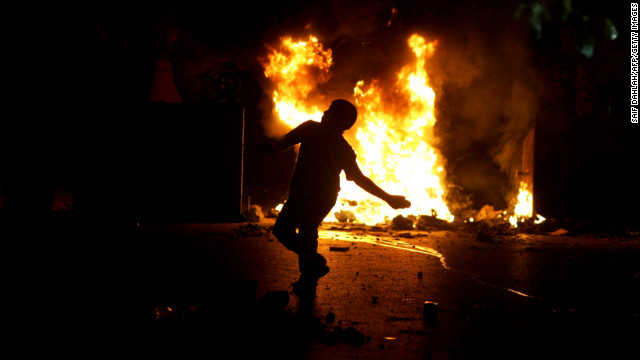 A Palestinian demonstrator throws stones in front of the headquarters of the Palestinian security forces in the West Bank city of Jenin on Sunday during a protest against Israel's ongoing military operation in Gaza.
A Palestinian demonstrator throws stones in front of the headquarters of the Palestinian security forces in the West Bank city of Jenin on Sunday during a protest against Israel's ongoing military operation in Gaza. 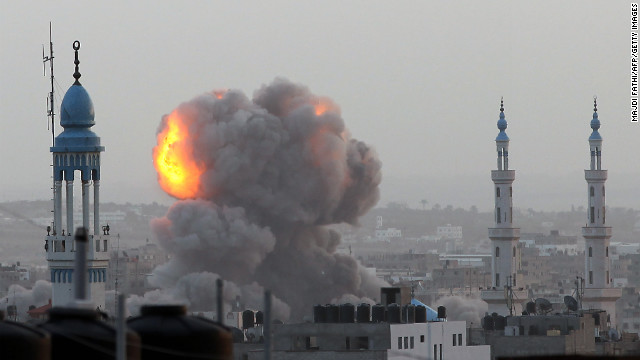 A fireball rises as the Israeli air force carries out a raid over Gaza City on Saturday, November 17.
A fireball rises as the Israeli air force carries out a raid over Gaza City on Saturday, November 17. 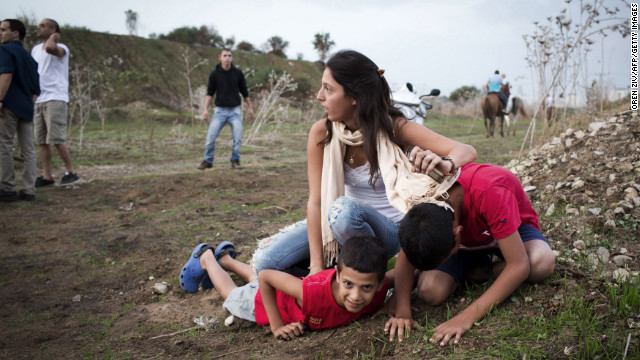 An Israeli woman and her children take cover as sirens wail in Tel Aviv on Saturday. Rocket attacks on Israel from Gaza by Palestinian militants were the "precipitating event" for the fighting under way now, U.S. President Barack Obama said Sunday.
An Israeli woman and her children take cover as sirens wail in Tel Aviv on Saturday. Rocket attacks on Israel from Gaza by Palestinian militants were the "precipitating event" for the fighting under way now, U.S. President Barack Obama said Sunday. 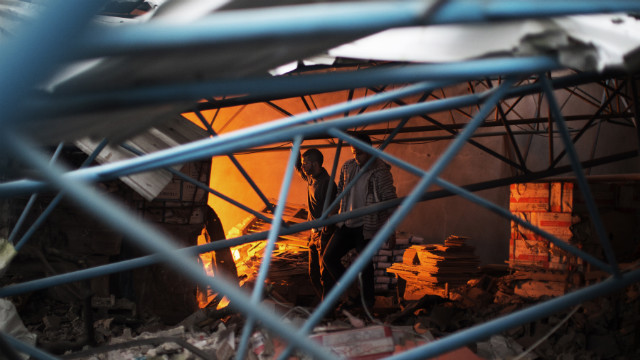 Palestinians walk amid the debris of a burning factory near the house of Ezzedine Haddad, commander of the armed wing of the Hamas movement, after it was destroyed during an Israeli air strike on Gaza City on Saturday.
Palestinians walk amid the debris of a burning factory near the house of Ezzedine Haddad, commander of the armed wing of the Hamas movement, after it was destroyed during an Israeli air strike on Gaza City on Saturday. 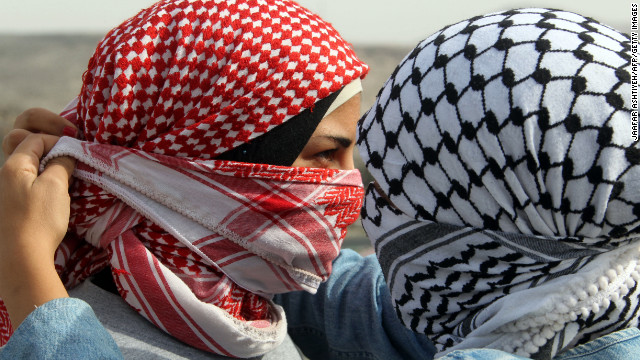 A Palestinian woman helps her friend cover her face with a traditional scarf during clashes at the Hawara checkpoint in the occupied West Bank city of Nablus on Saturday. People rallied against the Israeli military operations.
A Palestinian woman helps her friend cover her face with a traditional scarf during clashes at the Hawara checkpoint in the occupied West Bank city of Nablus on Saturday. People rallied against the Israeli military operations. 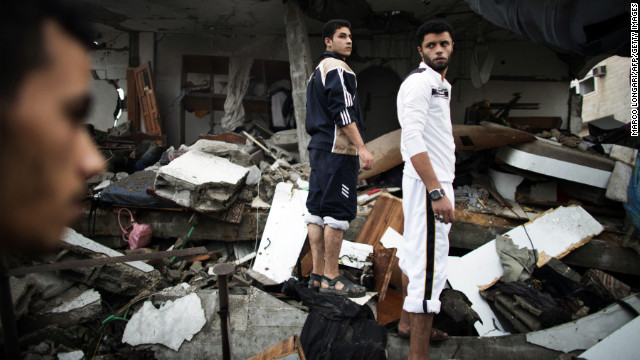 Palestinians stand on the rubble of the demolished home of Ezzedine Haddad, commander of the armed wing of the Hamas movement, the Ezzedine al-Qassam Brigades, that was destroyed by an Israeli airstrike in Gaza City on Saturday. Israeli air strikes in Gaza killed 10 Palestinians, five of them militants, as nine Israelis were hurt by rocket fire, four of them soldiers, medics said.
Palestinians stand on the rubble of the demolished home of Ezzedine Haddad, commander of the armed wing of the Hamas movement, the Ezzedine al-Qassam Brigades, that was destroyed by an Israeli airstrike in Gaza City on Saturday. Israeli air strikes in Gaza killed 10 Palestinians, five of them militants, as nine Israelis were hurt by rocket fire, four of them soldiers, medics said. 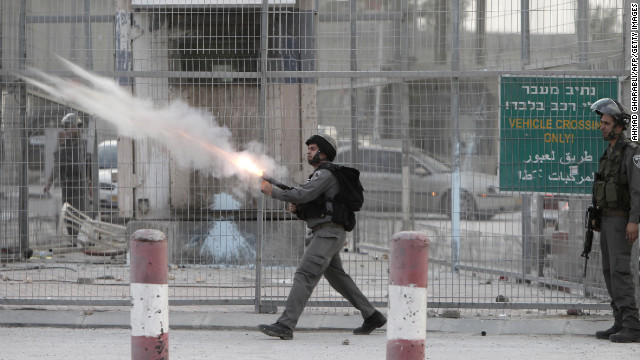 Israeli soldiers fire tear gas toward strone throwers demonstrating against the Israeli military offensive on the Gaza Strip at the Qalandia checkpoint, in the occupied West Bank, on Saturday. Israeli strikes on Gaza destroyed the Hamas government headquarters as Israel called up thousands more reservists for a possible ground war.
Israeli soldiers fire tear gas toward strone throwers demonstrating against the Israeli military offensive on the Gaza Strip at the Qalandia checkpoint, in the occupied West Bank, on Saturday. Israeli strikes on Gaza destroyed the Hamas government headquarters as Israel called up thousands more reservists for a possible ground war. 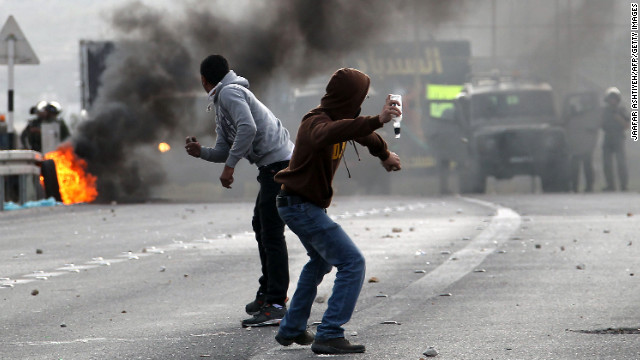 Palestinian youth clash with Israeli soldiers during protests at the Hawara checkpoin on Saturday.
Palestinian youth clash with Israeli soldiers during protests at the Hawara checkpoin on Saturday. 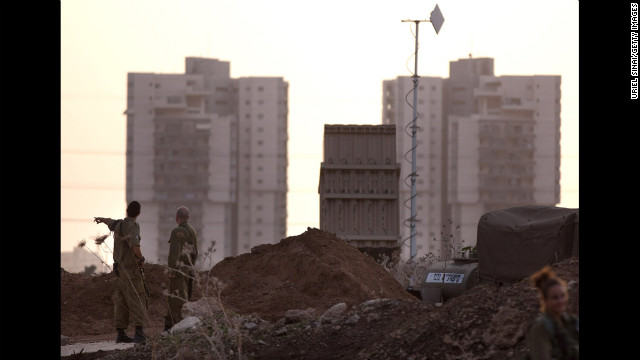 Israeli soldiers stand guard by the Iron Dome defense system launch site on Saturday in Tel Aviv, Israel.
Israeli soldiers stand guard by the Iron Dome defense system launch site on Saturday in Tel Aviv, Israel. 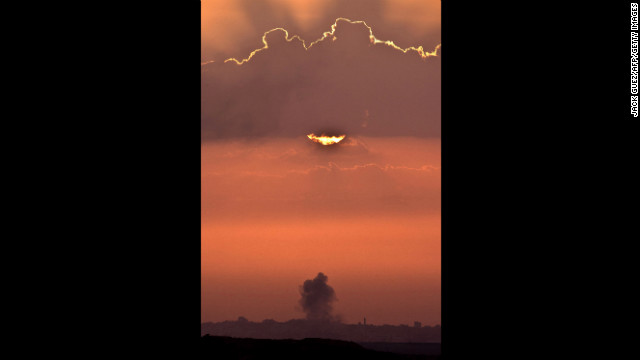 A picture taken from the southern Israeli border with Gaza shows smoke billowing following an Israeli air strike inside the Palestinian territory on Saturday. Turkish Prime Minister Recep Tayyip Erdogan said that Israel would be held to account for the children who were among 40 people dead in three days of airstrikes on Gaza.
A picture taken from the southern Israeli border with Gaza shows smoke billowing following an Israeli air strike inside the Palestinian territory on Saturday. Turkish Prime Minister Recep Tayyip Erdogan said that Israel would be held to account for the children who were among 40 people dead in three days of airstrikes on Gaza. 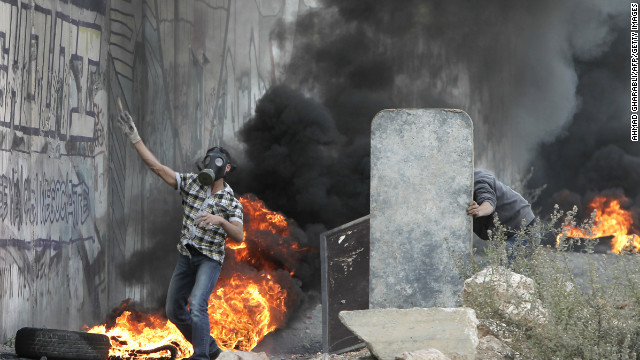 A Palestinian youth takes cover behind a makeshift barrier during clashes with Israeli soldiers on November 17, 2012. Israeli strikes on Gaza destroyed the Hamas government headquarters as Israel called up thousands more reservists for a possible ground war.
A Palestinian youth takes cover behind a makeshift barrier during clashes with Israeli soldiers on November 17, 2012. Israeli strikes on Gaza destroyed the Hamas government headquarters as Israel called up thousands more reservists for a possible ground war. 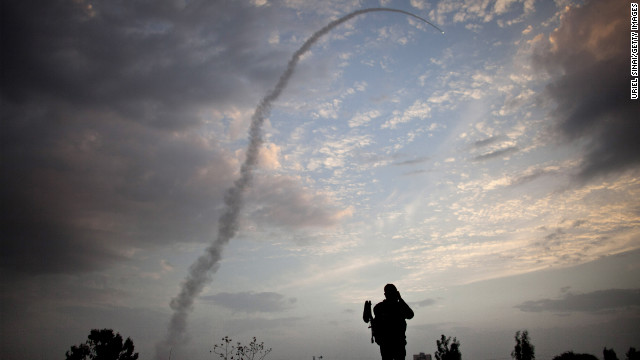 An Israeli missile from the Iron Dome defense missile system is launched to intercept and destroy incoming rocket fire from Gaza on November 17 in Tel Aviv, Israel. Israeli troops have been massing on the border as some 200 targets were hit overnight in Gaza, including Hamas cabinet buildings.
An Israeli missile from the Iron Dome defense missile system is launched to intercept and destroy incoming rocket fire from Gaza on November 17 in Tel Aviv, Israel. Israeli troops have been massing on the border as some 200 targets were hit overnight in Gaza, including Hamas cabinet buildings. 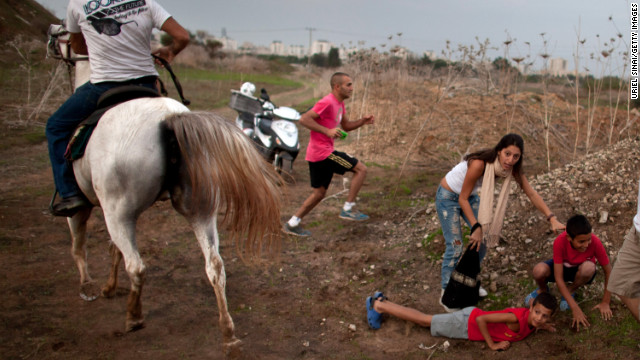 Israeli civilians run for cover during a rocket attack launched from Gaza on November 17 in Tel Aviv, Israel.
Israeli civilians run for cover during a rocket attack launched from Gaza on November 17 in Tel Aviv, Israel. 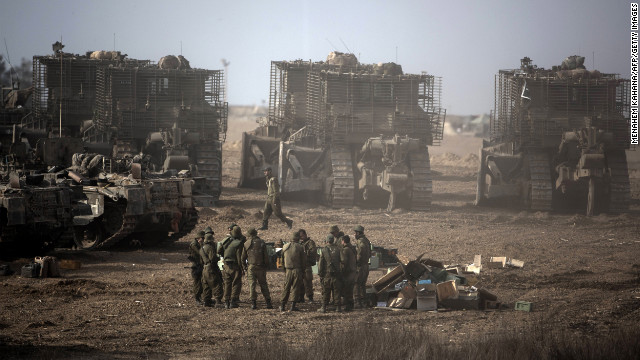 Israeli soldiers gather next to their armored bulldozers stationed on Israel's border with Gaza on Saturday, November 17.
Israeli soldiers gather next to their armored bulldozers stationed on Israel's border with Gaza on Saturday, November 17. 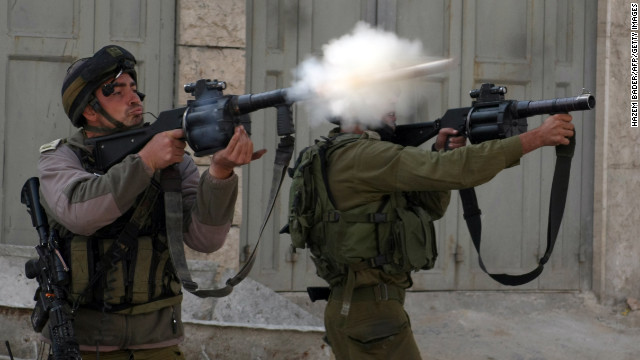 Israeli soldiers fire tear gas toward stone throwers demonstrating against the Israeli military offensive in Gaza in the village of Beit Omar, north of the West Bank town of Hebron, on Saturday. Egypt and Turkey put the onus on Israel to end the fighting around Gaza as Turkish Prime Minister Recep Tayyip Erdogan visited Cairo a day after Washington urged the two governments to pressure the Palestinians.
Israeli soldiers fire tear gas toward stone throwers demonstrating against the Israeli military offensive in Gaza in the village of Beit Omar, north of the West Bank town of Hebron, on Saturday. Egypt and Turkey put the onus on Israel to end the fighting around Gaza as Turkish Prime Minister Recep Tayyip Erdogan visited Cairo a day after Washington urged the two governments to pressure the Palestinians. 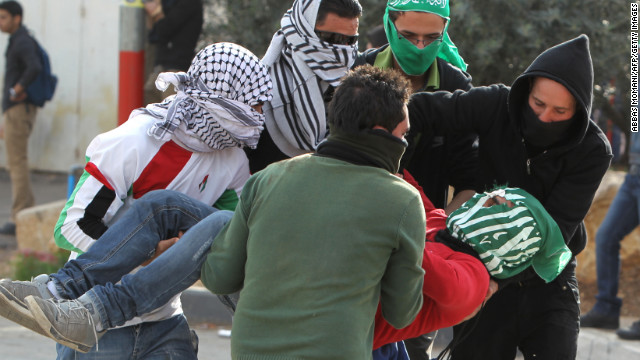 An injured student from the University of Birzeit is carried away Saturday during clashes with Israeli soldiers as hundreds of students took part in a demonstration against the ongoing Israeli military offensive on the Gaza Strip in the Israeli occupied West Bank town of Betunia. Israeli strikes on Gaza killed 10 Palestinians and destroyed the Hamas government headquarters.
An injured student from the University of Birzeit is carried away Saturday during clashes with Israeli soldiers as hundreds of students took part in a demonstration against the ongoing Israeli military offensive on the Gaza Strip in the Israeli occupied West Bank town of Betunia. Israeli strikes on Gaza killed 10 Palestinians and destroyed the Hamas government headquarters. 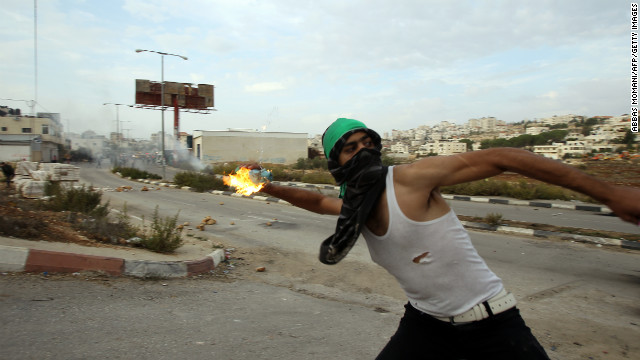 A student from the University of Birzeit throws a molotov cocktail toward Israeli soldiers during clashes.
A student from the University of Birzeit throws a molotov cocktail toward Israeli soldiers during clashes. 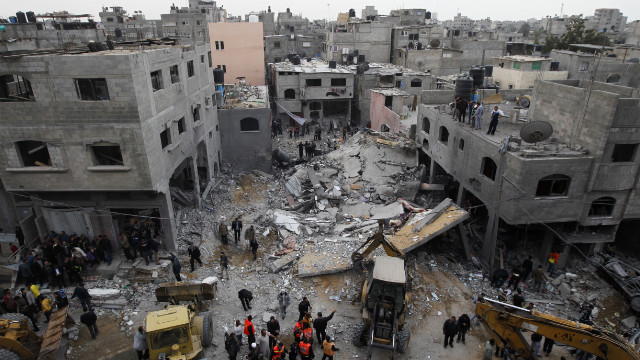 Palestinians gather at the site of an Israeli air raid in Gaza City on November 17, 2012. Israeli air strikes hit the cabinet headquarters of Gaza's Hamas government after militants fired rockets at Jerusalem and Tel Aviv as Israel called up thousands more reservists in readiness for a potential ground war.
Palestinians gather at the site of an Israeli air raid in Gaza City on November 17, 2012. Israeli air strikes hit the cabinet headquarters of Gaza's Hamas government after militants fired rockets at Jerusalem and Tel Aviv as Israel called up thousands more reservists in readiness for a potential ground war. 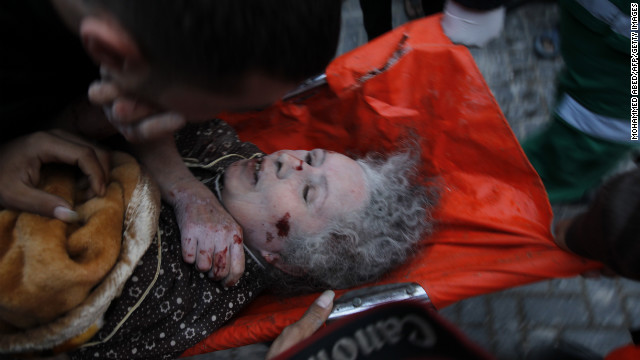 Palestinian paramedics carry an injured woman on a stretcher Saturday following an Israeli air raid on a house in Beit Lahia in the northern Gaza Strip.
Palestinian paramedics carry an injured woman on a stretcher Saturday following an Israeli air raid on a house in Beit Lahia in the northern Gaza Strip. 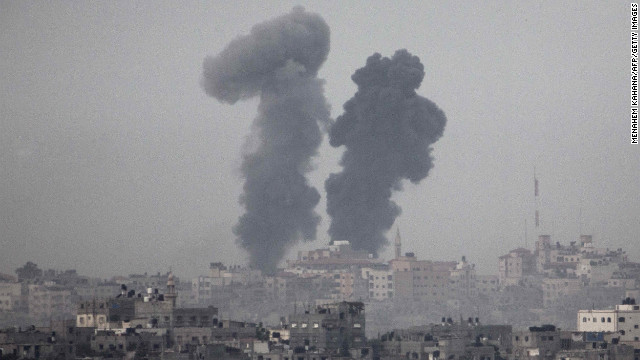 Smoke billows across the southern Israeli border with the Gaza Strip on Saturday following Israeli air strikes inside the Palestinian territory.
Smoke billows across the southern Israeli border with the Gaza Strip on Saturday following Israeli air strikes inside the Palestinian territory. 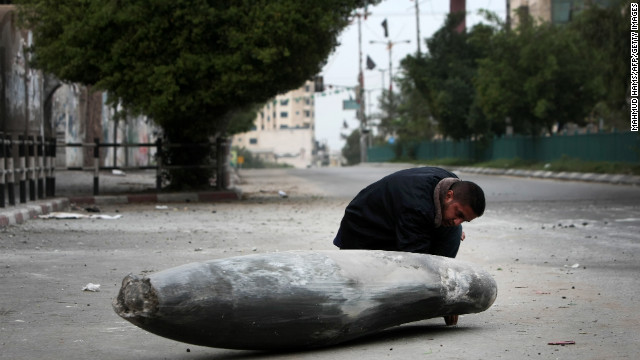 A Palestinian Hamas policeman looks at an Israeli rocket in the street in Gaza City on Saturday.
A Palestinian Hamas policeman looks at an Israeli rocket in the street in Gaza City on Saturday. 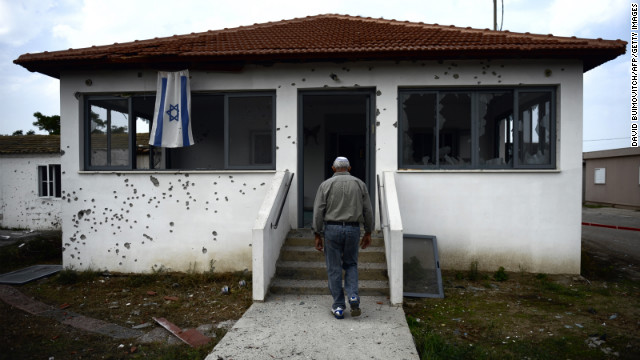 An Israeli man walks to his house damaged by a rocket fired by Palestinian militants from the Gaza Strip in the moshav of Sde Uziyahu near the southern Israeli city of Ashdod. The Israeli military said it had sealed off all main roads around Gaza and declared a closed military zone, in the latest sign it was poised to launch a first ground offensive on the Palestinian enclave since December 2008-January 2009.
An Israeli man walks to his house damaged by a rocket fired by Palestinian militants from the Gaza Strip in the moshav of Sde Uziyahu near the southern Israeli city of Ashdod. The Israeli military said it had sealed off all main roads around Gaza and declared a closed military zone, in the latest sign it was poised to launch a first ground offensive on the Palestinian enclave since December 2008-January 2009. 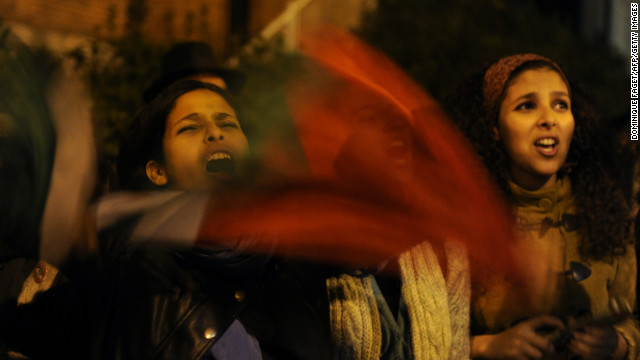 Pro-Palestinian demonstrators protest near the Israeli Embassy in Madrid on Friday against Israel's aerial bombardment of the Gaza Strip.
Pro-Palestinian demonstrators protest near the Israeli Embassy in Madrid on Friday against Israel's aerial bombardment of the Gaza Strip. 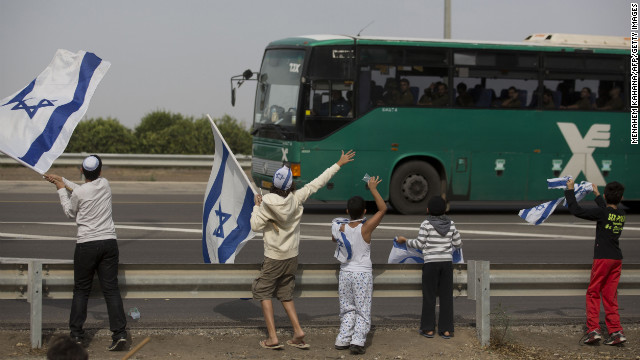 Israeli children wave their national flag Saturday as they greet a bus carrying soldiers on a road leading to the Israel-Gaza border near the southern Israeli town of Ofakim.
Israeli children wave their national flag Saturday as they greet a bus carrying soldiers on a road leading to the Israel-Gaza border near the southern Israeli town of Ofakim. 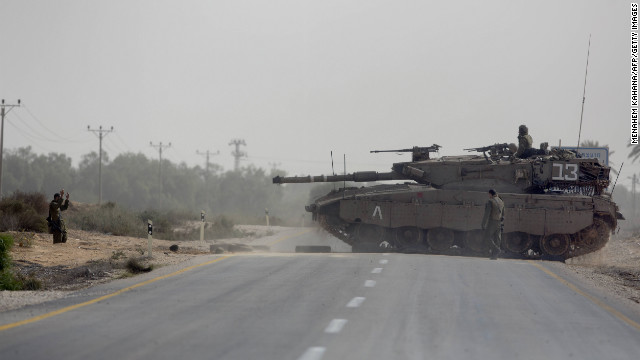 Israeli tanks maneuver at the Israeli-Gaza Strip border.
Israeli tanks maneuver at the Israeli-Gaza Strip border. 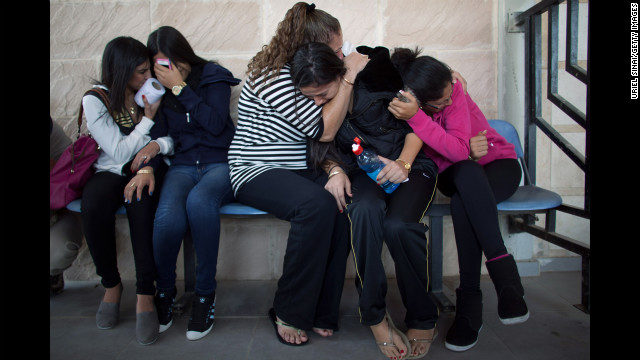 Relatives take cover from a rocket attack during the funeral for Itzik Amsalem in Kiryat Malachi, Israel, on Friday, November 16. At least three people were killed in the Israeli town when a rocket fired from Gaza struck an apartment building there on Thursday. Fighting between Israel and Hamas militants persisted Friday with no immediate end in sight.
Relatives take cover from a rocket attack during the funeral for Itzik Amsalem in Kiryat Malachi, Israel, on Friday, November 16. At least three people were killed in the Israeli town when a rocket fired from Gaza struck an apartment building there on Thursday. Fighting between Israel and Hamas militants persisted Friday with no immediate end in sight. 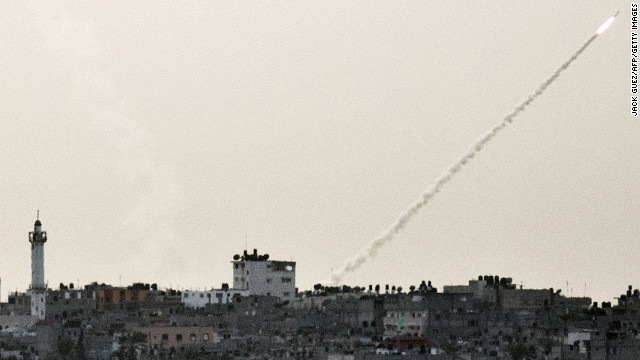 A rocket fired from Gaza toward Israel sails into the air Friday.
A rocket fired from Gaza toward Israel sails into the air Friday. 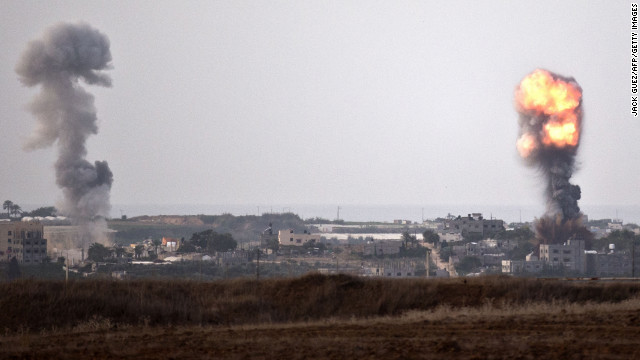 Explosions erupt from spots targeted by Israeli airstrikes inside Gaza on Friday.
Explosions erupt from spots targeted by Israeli airstrikes inside Gaza on Friday. 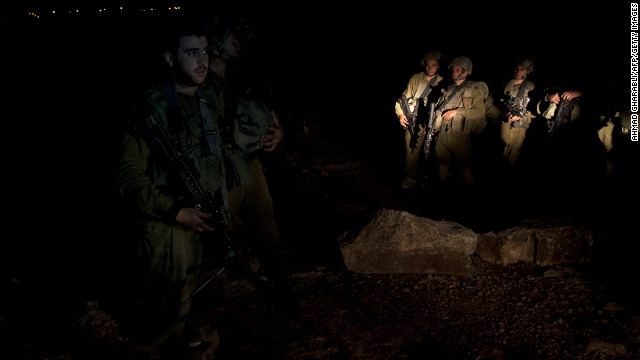 Israeli soldiers stand guard while explosives experts examine the site where a rocket fired from the Gaza Strip landed near the Jewish settlement of Gush Etzion in the village of Kisan, south of Bethlehem on Friday.
Israeli soldiers stand guard while explosives experts examine the site where a rocket fired from the Gaza Strip landed near the Jewish settlement of Gush Etzion in the village of Kisan, south of Bethlehem on Friday. 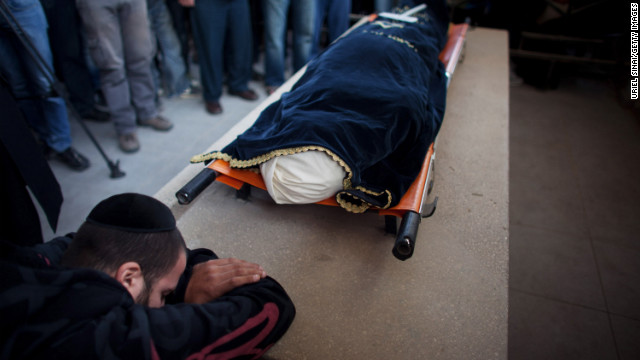 A relative grieves during the funeral for Itzik Amsalem in Kiryat Malakhi, Israel, on Friday.
A relative grieves during the funeral for Itzik Amsalem in Kiryat Malakhi, Israel, on Friday. 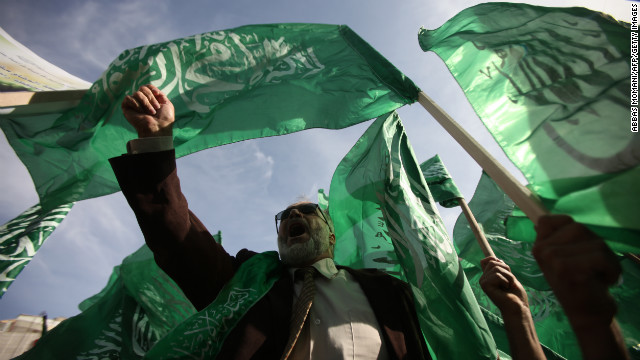 Palestinian protesters hold up the Hamas flag during a rally Friday in the West Bank city of Ramallah.
Palestinian protesters hold up the Hamas flag during a rally Friday in the West Bank city of Ramallah. 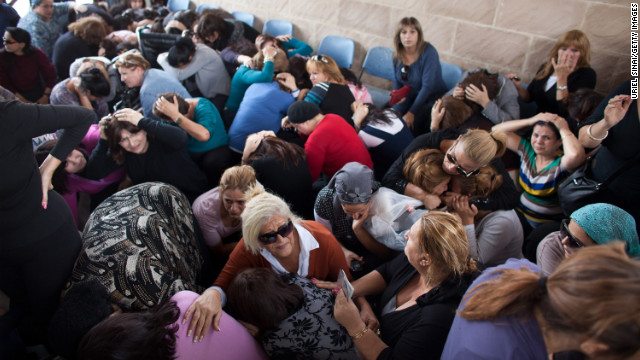 People take cover during a rocket attack at a funeral Friday in Kiryat Malakhi, Israel.
People take cover during a rocket attack at a funeral Friday in Kiryat Malakhi, Israel. 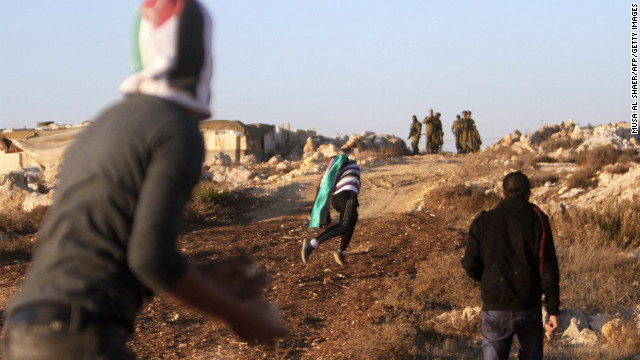 Palestinian youths throw stones at Israeli security forces Friday in a West Bank village near Bethlehem.
Palestinian youths throw stones at Israeli security forces Friday in a West Bank village near Bethlehem. 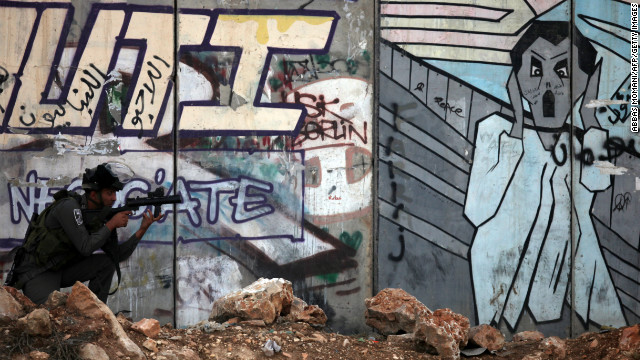 An Israeli soldier aims at Palestinian youth at a West Bank checkpoint Friday during a protest against the fighting in Gaza.
An Israeli soldier aims at Palestinian youth at a West Bank checkpoint Friday during a protest against the fighting in Gaza. 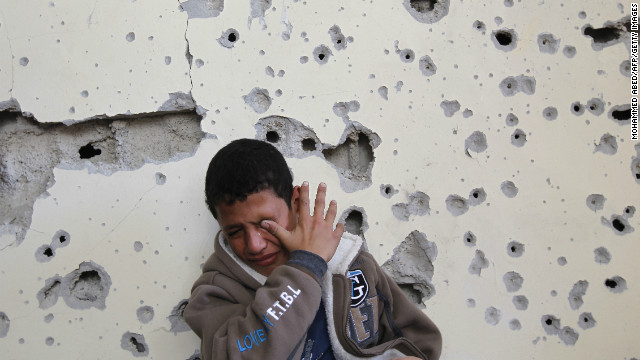 Palestinian Fares Sadallah, 11, cries outside his home after an Israeli airstrike Friday in northern Gaza.
Palestinian Fares Sadallah, 11, cries outside his home after an Israeli airstrike Friday in northern Gaza. 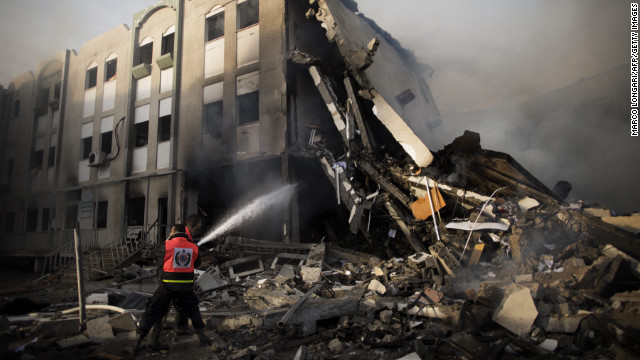 Palestinian firefighters try to extinguish a blaze Friday at the Ministry of Interior in Gaza City following an Israeli air raid.
Palestinian firefighters try to extinguish a blaze Friday at the Ministry of Interior in Gaza City following an Israeli air raid. 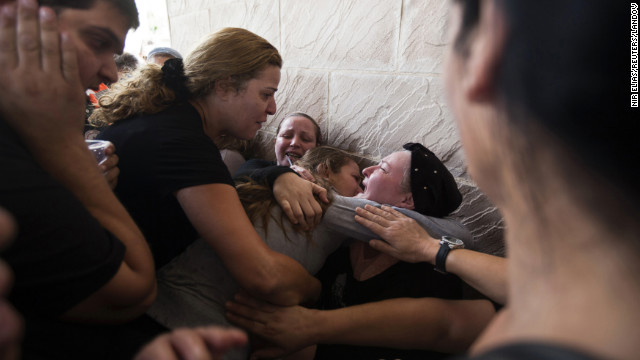 Relatives of Itzik Amsalam, who was killed Thursday in Kiryat Malakhi, Israel, mourn during Friday's funeral.
Relatives of Itzik Amsalam, who was killed Thursday in Kiryat Malakhi, Israel, mourn during Friday's funeral. 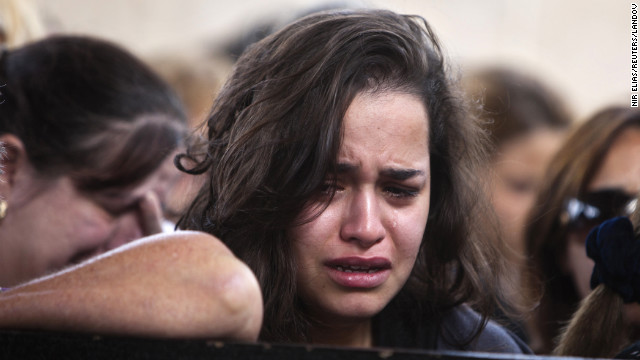 A woman cries during the funeral of Itzik Amsalam on Friday.
A woman cries during the funeral of Itzik Amsalam on Friday. 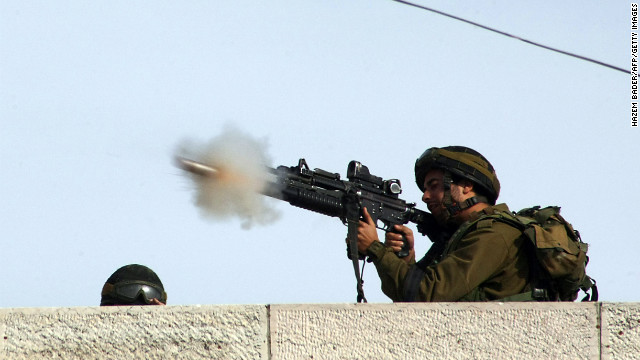 An Israeli soldier fires a tear gas canister toward Palestinian stone throwers on a road mainly used by Israeli settlers in the West Bank village of Beit Omar on Friday.
An Israeli soldier fires a tear gas canister toward Palestinian stone throwers on a road mainly used by Israeli settlers in the West Bank village of Beit Omar on Friday. 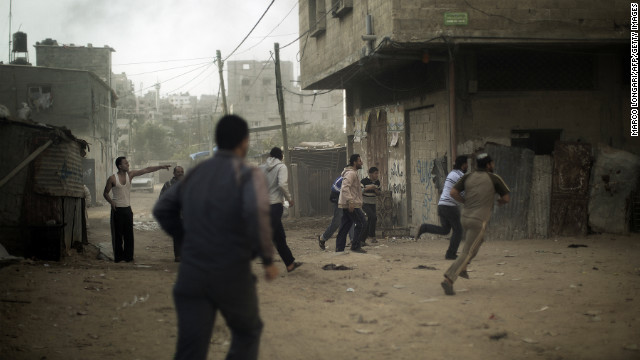 Palestinians run for cover after an Israeli airstrike hits Gaza City on Friday.
Palestinians run for cover after an Israeli airstrike hits Gaza City on Friday. 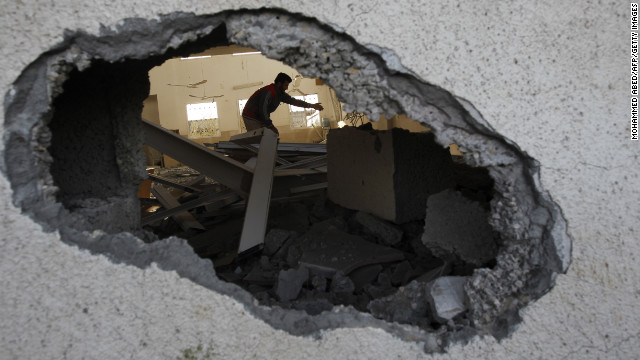 Palestinian youths inspect a destroyed mosque in northern Gaza on Friday.
Palestinian youths inspect a destroyed mosque in northern Gaza on Friday. 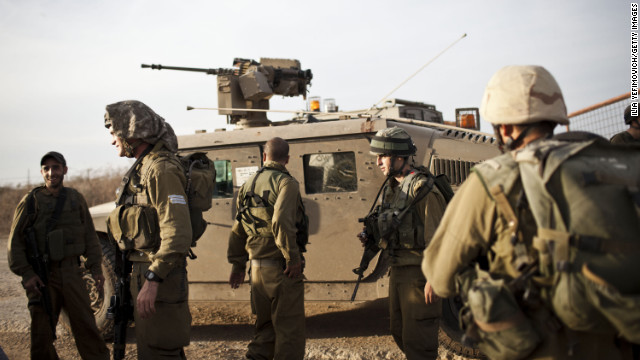 Israeli soldiers conduct a patrol as some 16,000 reserve troops are drafted in on Friday.
Israeli soldiers conduct a patrol as some 16,000 reserve troops are drafted in on Friday. 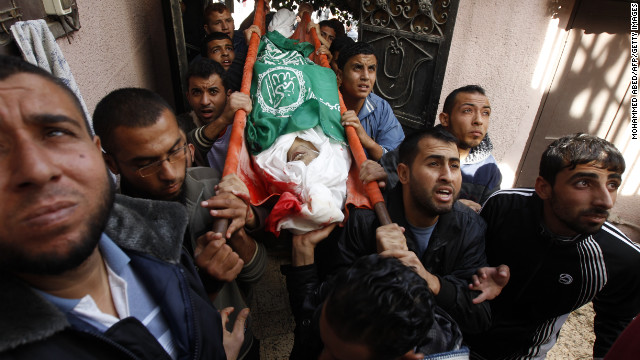 Palestinian mourners carry the body of Audi Naser during his funeral in Gaza on Friday.
Palestinian mourners carry the body of Audi Naser during his funeral in Gaza on Friday. 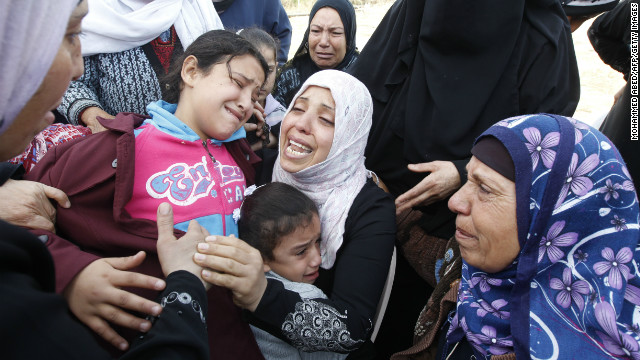 Palestinian women and children cry during the funeral of Audi Naser on Friday.
Palestinian women and children cry during the funeral of Audi Naser on Friday. 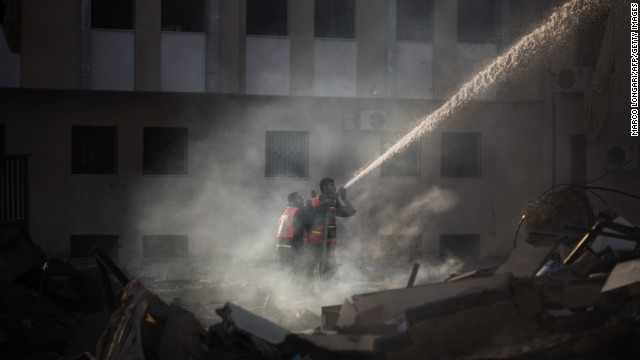 Palestinian firefighters try to extinguish a fire at the Civilian Affairs branch of the Ministry of Interior on Friday.
Palestinian firefighters try to extinguish a fire at the Civilian Affairs branch of the Ministry of Interior on Friday. 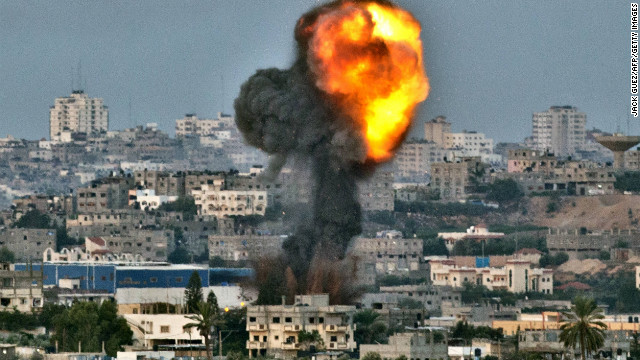 Smokes billows from a target of an Israeli airstrike Friday in Gaza near the border with Israel.
Smokes billows from a target of an Israeli airstrike Friday in Gaza near the border with Israel. 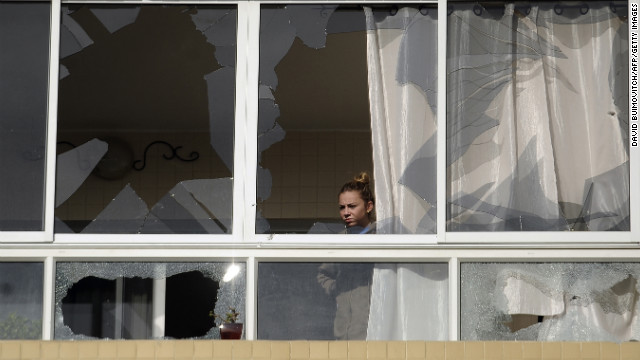 An Israeli woman looks out from an apartment building in Ashdod, Israel, damaged by a rocket fired by Palestinian militants on Friday.
An Israeli woman looks out from an apartment building in Ashdod, Israel, damaged by a rocket fired by Palestinian militants on Friday. 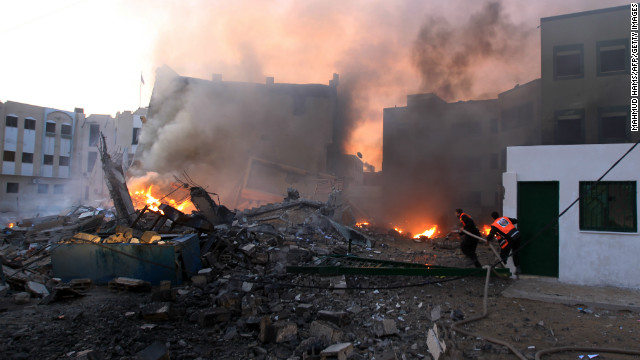 Palestinians extinguish a fire after Israeli airstrikes targeted the Interior Ministry building in Gaza City Friday.
Palestinians extinguish a fire after Israeli airstrikes targeted the Interior Ministry building in Gaza City Friday. 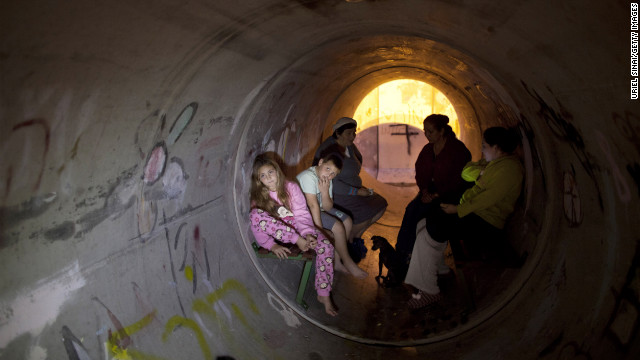 Israelis take cover in a pipe used as a bomb shelter, after a rocket was launched from the Gaza Strip on Thursday, November 15 in Kiryat Malachi, Israel. Rockets and shells crisscrossed between Israel and Gaza on Thursday as Palestinian militants continued rocket attacks on Israeli civilians and Israel pounded what it called terror sites.
Israelis take cover in a pipe used as a bomb shelter, after a rocket was launched from the Gaza Strip on Thursday, November 15 in Kiryat Malachi, Israel. Rockets and shells crisscrossed between Israel and Gaza on Thursday as Palestinian militants continued rocket attacks on Israeli civilians and Israel pounded what it called terror sites. 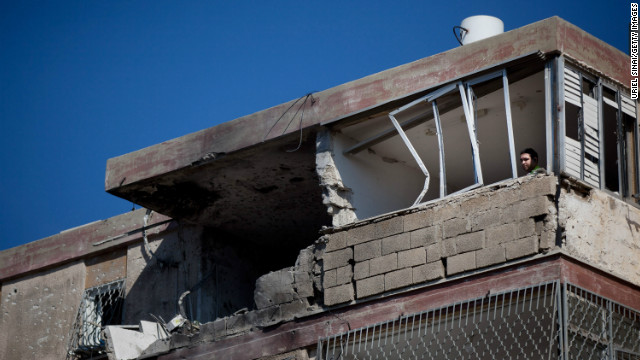 An Israeli man looks out from an apartment building that was hit by a rocket launched presumably from the Gaza Strip, claiming three lives on Thursday in Kiryat Malachi, Israel.
An Israeli man looks out from an apartment building that was hit by a rocket launched presumably from the Gaza Strip, claiming three lives on Thursday in Kiryat Malachi, Israel. 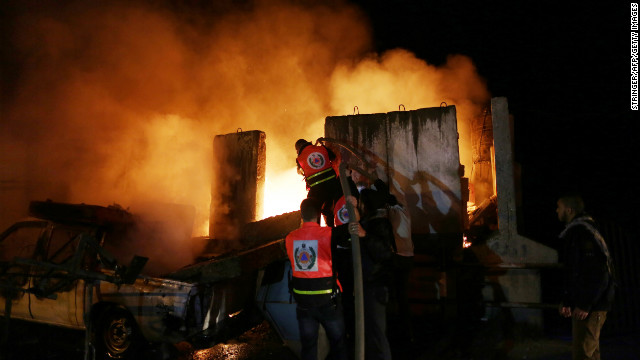 Palestinians extinguish a fire after Israeli air strikes targeted an electricity generator that fed the house of Hamas's Prime Minister Ismail Haniyeh in Gaza City, on Thursday.
Palestinians extinguish a fire after Israeli air strikes targeted an electricity generator that fed the house of Hamas's Prime Minister Ismail Haniyeh in Gaza City, on Thursday. 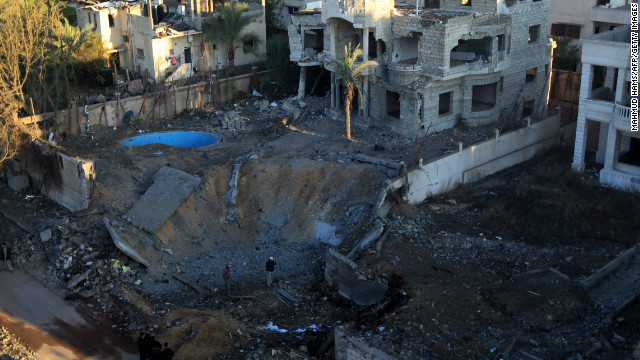 A crater is left at a spot targeted by an Israeli airstrike in Gaza City early Thursday.
A crater is left at a spot targeted by an Israeli airstrike in Gaza City early Thursday. 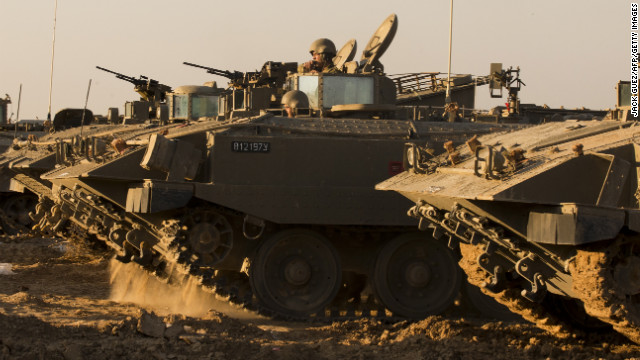 Israeli soldiers rest by their armored personnel carriers stationed on the Israel-Gaza border on Thursday.
Israeli soldiers rest by their armored personnel carriers stationed on the Israel-Gaza border on Thursday. 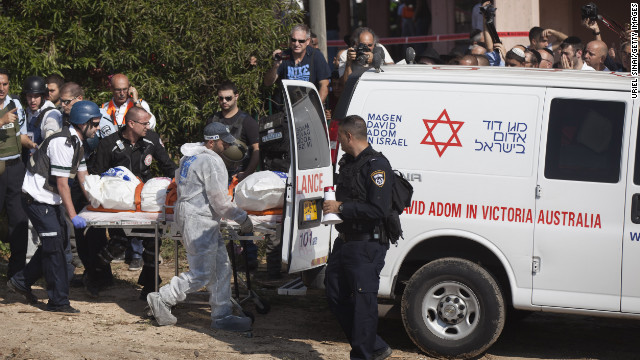 Rescue workers evacuate a body Thursday in the Israeli town of Kiryat Malakhi after a rocket launched from Gaza hit an apartment building.
Rescue workers evacuate a body Thursday in the Israeli town of Kiryat Malakhi after a rocket launched from Gaza hit an apartment building. 
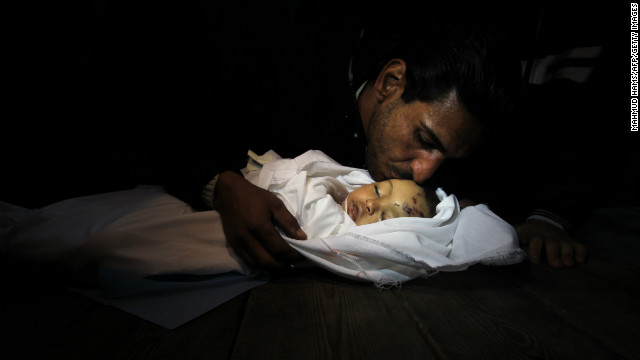 Palestinian relatives mourn over the body of Hanen Tafish, a 10-month-old girl, at the morgue of the al-Shifa hospital in Gaza City on Thursday after she died following an Israeli air strike in the Zeitun neighbourhood.
Palestinian relatives mourn over the body of Hanen Tafish, a 10-month-old girl, at the morgue of the al-Shifa hospital in Gaza City on Thursday after she died following an Israeli air strike in the Zeitun neighbourhood. 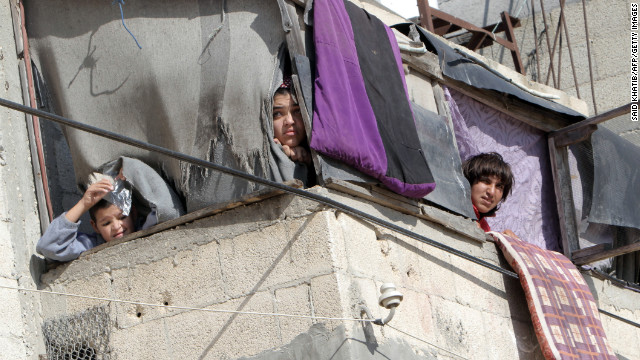 Palestinians watch a funeral Thursday in southern Gaza.
Palestinians watch a funeral Thursday in southern Gaza. 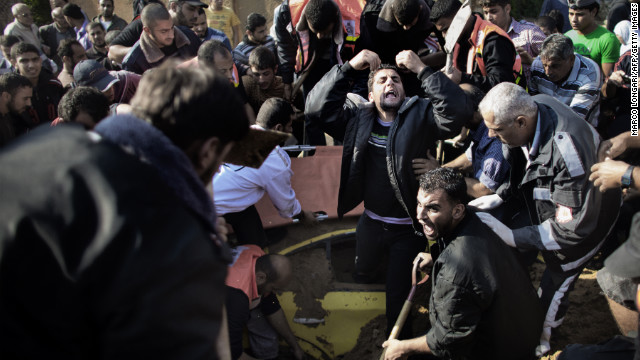 A Palestinian pleads for help as he and others try to save a man trapped under his car after an Israeli air raid Thursday in northern Gaza.
A Palestinian pleads for help as he and others try to save a man trapped under his car after an Israeli air raid Thursday in northern Gaza. 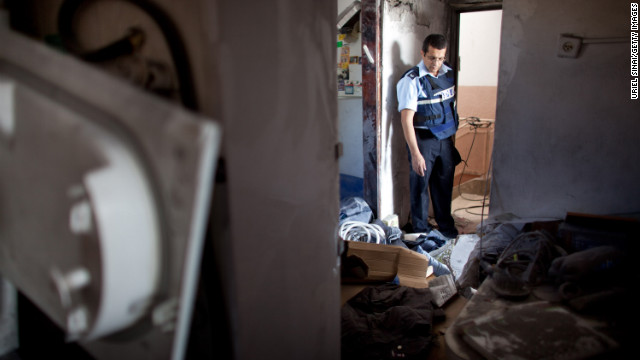 Israeli police inspect an apartment building hit by a rocket fired by Palestinian militants in Kiryat Malakhi on Thursday. At least three Israelis were killed and four were wounded, an Israeli police spokesman said.
Israeli police inspect an apartment building hit by a rocket fired by Palestinian militants in Kiryat Malakhi on Thursday. At least three Israelis were killed and four were wounded, an Israeli police spokesman said. 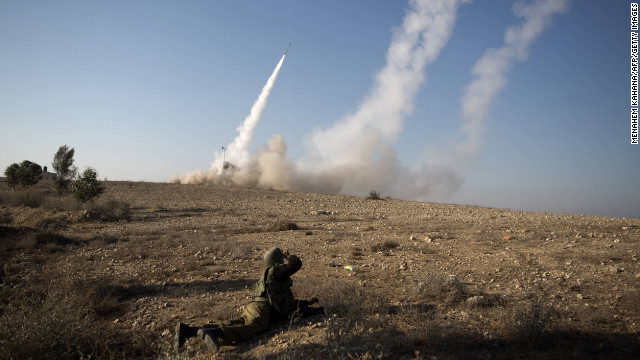 The Israeli military launches a missile Thursday from the southern city of Beersheba.
The Israeli military launches a missile Thursday from the southern city of Beersheba. 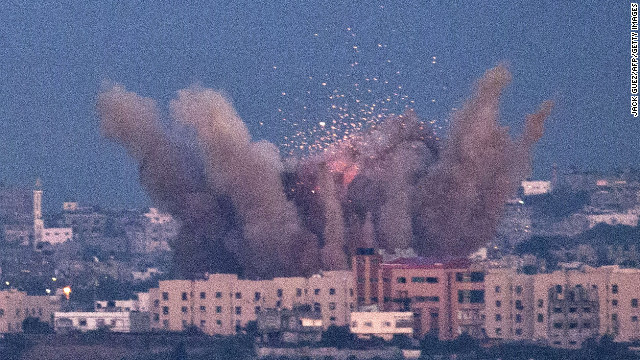 A picture taken from the southern Israeli town of Sderot shows smoke billowing from a spot targeted by an Israeli airstrike inside Gaza on Thursday.
A picture taken from the southern Israeli town of Sderot shows smoke billowing from a spot targeted by an Israeli airstrike inside Gaza on Thursday. 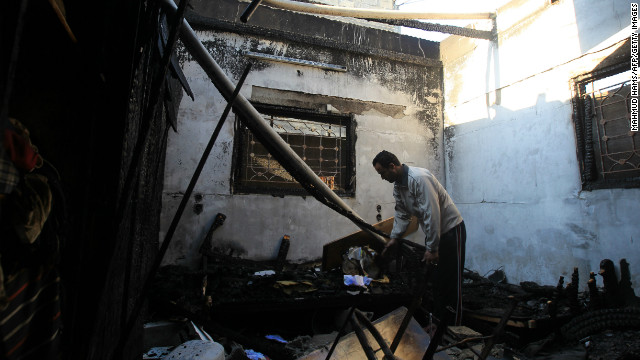 A Palestinian man inspects his damaged house following an Israeli airstrike early Thursday in Gaza City.
A Palestinian man inspects his damaged house following an Israeli airstrike early Thursday in Gaza City. 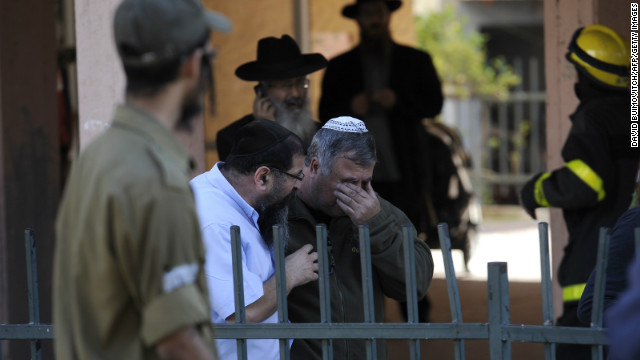 An Israeli reacts after a rocket launched from Gaza hits a building Thursday in Kiryat Malakhi.
An Israeli reacts after a rocket launched from Gaza hits a building Thursday in Kiryat Malakhi. 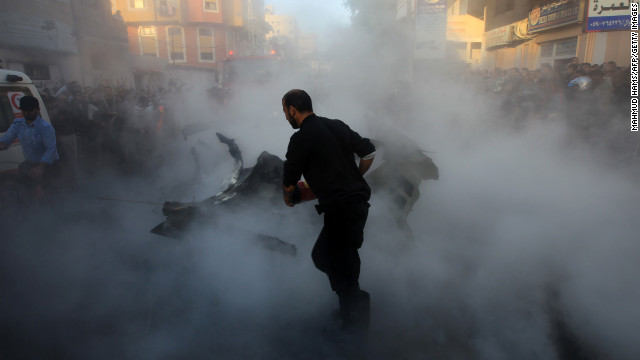 Palestinian firefighters extinguish the blaze from the car of Ahmed al-Jaabari, head of Hamas' military wing, after an Israeli airstrike hit it in Gaza City on Wednesday, November 14. The Israeli strike killed al-Jaabari.
Palestinian firefighters extinguish the blaze from the car of Ahmed al-Jaabari, head of Hamas' military wing, after an Israeli airstrike hit it in Gaza City on Wednesday, November 14. The Israeli strike killed al-Jaabari. 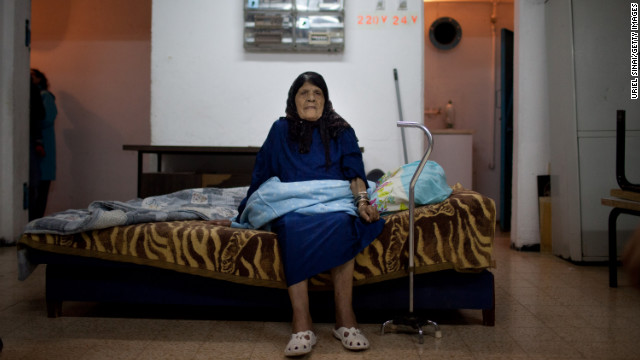 A woman sits inside a bomb shelter Wednesday in Netivot, Israel.
A woman sits inside a bomb shelter Wednesday in Netivot, Israel. 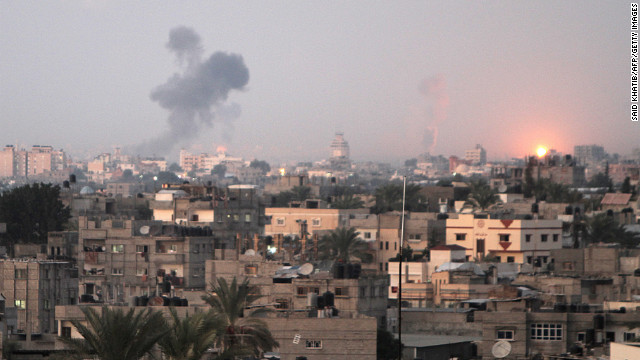 Smoke rises following an Israeli airstrike Wednesday in Khan Younis, Gaza.
Smoke rises following an Israeli airstrike Wednesday in Khan Younis, Gaza. 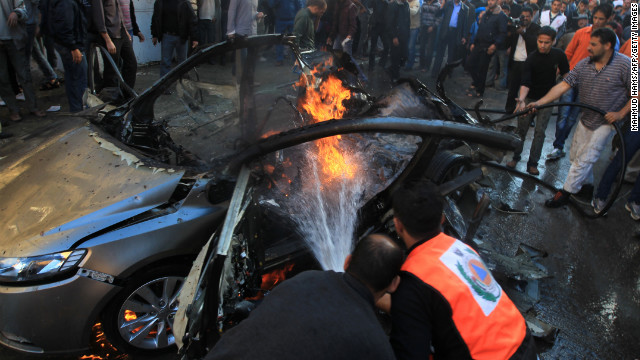 Palestinian firefighters extinguish fire from the car in which al-Jaabari was apparently riding.
Palestinian firefighters extinguish fire from the car in which al-Jaabari was apparently riding. 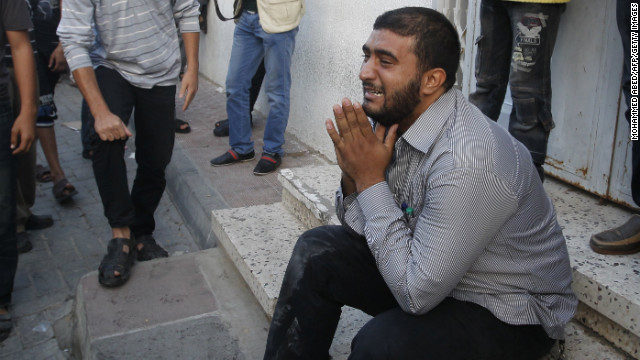 A Palestinian man cries as security forces wheel al-Jaabari's body into a hospital.
A Palestinian man cries as security forces wheel al-Jaabari's body into a hospital. 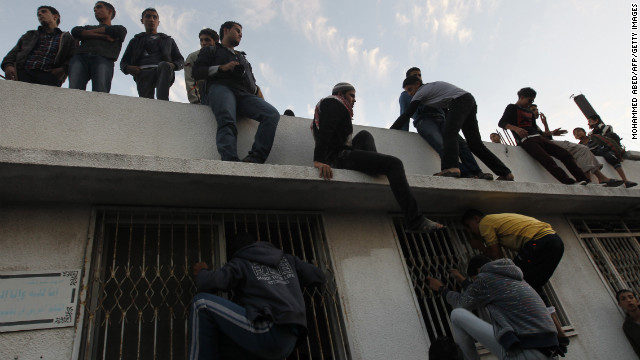 Palestinian youths look inside a building where al-Jaabari's body was brought after the attack.
Palestinian youths look inside a building where al-Jaabari's body was brought after the attack. 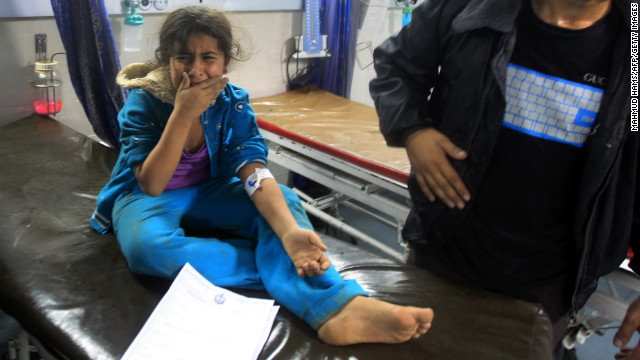 A wounded Palestinian girl cries at the Al-Shifa Hospital in Gaza City.
A wounded Palestinian girl cries at the Al-Shifa Hospital in Gaza City. 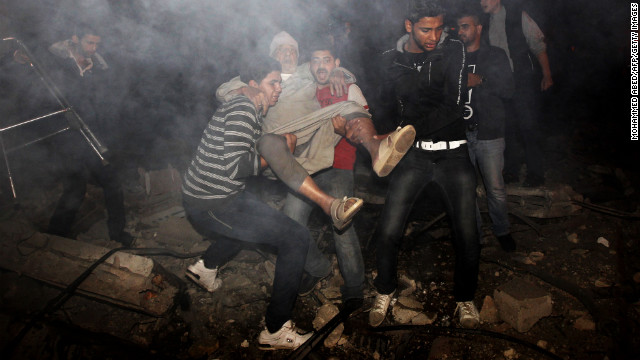 Palestinian youths evacuate an elderly man following an Israeli airstrike.
Palestinian youths evacuate an elderly man following an Israeli airstrike. 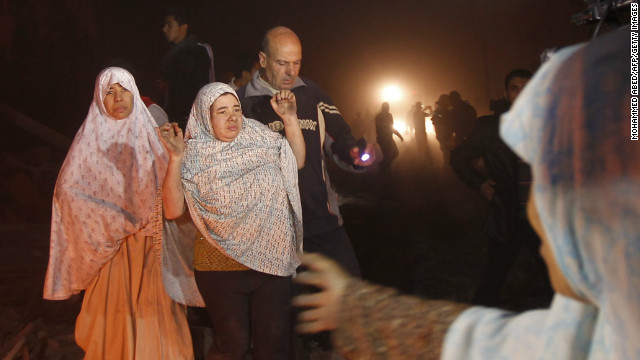 Palestinian civilians leave their houses following an Israeli airstrike.
Palestinian civilians leave their houses following an Israeli airstrike. 




































































































